#and have us witness that portion of his character developement in real time instead of being told about it
Explore tagged Tumblr posts
Text
anyone interested in talking about the iconic 2000's middle-grade-bordering-on-ya book series gallagher girls??
#okay incoming rant about this series#i read the first book when i was 10 or 11 and i was absolutely obssessed with it. i read it so many times i had the entire story memorized#the issue was that i could not find the rest of the series anywhere. it was either sold out or out of stock#and then i found out that only the first 3 books had been translated into my first language so at that point i kinda gave up on them#anyway#flashforward to a couple of weeks ago#i was re organizing my bookshelf and on the back i found LYKY (is this how y'all are abreviating it??)#and remembred how much i loved it#and since i'm now fluent in english and was stuck at home recovering from a surgery i decided to download the entire series and read it#to find out what the fuck happened afterwards#long story short i read all six books in 4 or 5 days#and i haven't stopped thinking about them since#it's actually so funny how little information we have in the first book#i went all of these years thinking it was mostly a silly series about a boarding school for spies when actually SO MUCH happens afterwards#i can't believe i went all of these years unaware of zach goode's existence#truly character of all time#but also i can't stop thinking about how interesting it would have been if zach had come to hate the circle and his mom during the series#rather than before#make it a true enemies to lovers#and have us witness that portion of his character developement in real time instead of being told about it#like him slowly realizing through cammie and his time at gallagher that maybe what they were doing is wrong#i think it would have been very interesting to read#although let's be real it took me until halfway through book four to trust him and he was fully one of the good guys so..#but yeah i have a lot more to say but these tags are long enough#gallagher girls#okay i just want to add another funny anecdote about my experience with this series#my copy of LYKY has an age warning in the back recomending that readers should be above 13 yo to read it#and i distinctly remember finishing it and thinking the warning was kind of dumb bcs besides a few mentions of death and other heavier topi#nothing really happened#and now i realize it was a warning for the rest of the series not just the first book because jesus fucking chirst everything after
79 notes
·
View notes
Text
We learned a lot about each of Jesus's followers from episode 3. A lot of what's been beautifully displayed/shown for us had a chance to be articulated and told to us here (in a natural way--great storytelling!). So let's break it down in a meta longer than what any of you asked for:
John - the themes explored in S2E1, which are very present in his gospel, are here again! He expresses awe at the fact that he--"a nobody"--is not only alive at the time of the Messiah, and not only sees Him, but travels with Him and is close with Him. That wonder at the personal, loving relationship we can have with God--that defines both John and his writings. But, we also see him give in to pride (setting up James to be better than the others, and his comment to "ask Matthew") and anger (accusing Simon, even if ostensibly in Matthew's defense, showed both anger and pride (a "you're no better than the rest of us!" mentality)).
Big James - we learn that he loves to study and has more theological/Torah knowledge than almost all of the group. He's a rule-follower, who loves the law and its structure (a foreshadowing of his eventual reluctance to accept Gentile converts who did not first convert to Judaism). More importantly, we see him acting as a moderating influence on the group. He comforts Mary when she expresses her insecurities about her past, and tries to get Simon to stop attacking Matthew. But, we also see how quickly he can become indignant and proud (telling Simon to sit down, instead of simply sitting down himself--"someone else must give in first, not me").
Simon - finally finally FINALLY we get to understand why exactly he's so mad and spiteful towards Matthew. He comes off as kind of a jerk half the time, but this moment (although heart-wrenching for Matthew's sake) helps to humanize Simon too. We get to see the roots of that protective, communal nature that will eventually make him such a good leader, and we see how deeply and passionately he cares for Israel. But we also see that he still struggles to accept those who are unlike him, and this will be a theme for the rest of his life, as he is called to minister to the Gentiles and told that all foods are clean. "Different" is something it takes Simon a long time to get used to. Additionally, his refusal to forgive Matthew is setting up his conversation with Jesus where he asks, "If my brother sins against me, how many times must I forgive him? Seven times?" (This was two-and-a-half times more than the required amount, so he probably thought he was going above and beyond.) I can just see Jesus knowing who Simon is thinking of and telling him, "No, you must forgive your brother seventy times seven times!"
Little James - we get to know a little about him! I just threw him on here since previously we haven't seen much of him and now we understand him a little more. We get to see him bond with Thomas, who's the first person we see really reach out to him, and we see his insecurity and his worry that Jesus will think less of him or change His mind about him. (What a relatable struggle!)
Thomas - what we learn about Thomas surprises us! We're told earlier that "being methodical is his thing" (S2E1), and he seems fairly shy at points, so we assume he must be like Matthew, or Philip. But he's not! He doesn't like the rules. He's somebody who questions things. (Shocker--he questions Jesus's resurrection too! Great set-up and character-building there.) He even says "I'd like to ask Him about that" (referencing Jesus losing His father, but showing that Thomas is someone who naturally asks and seeks). His innate drive to search out the truth is an asset, similar to Nathanael, but also similar is his hesitancy (and at times, flat refusal) to accept the truth because it seems hard to believe. It can also make him combative with those who have more faith, or more respect for the rules (there is some brief tension between him and Big James when discussing Torah, for example).
Mary - we learn that she is eager to learn the Scriptures, something that she as a woman was never allowed to do--and also that she feels she needs to relearn her Jewish-ness. She is ashamed of who she was before and felt that she turned her back on her true identity...sound similar to anyone?? It's no small wonder that she's sympathetic toward Matthew. Simon's outburst directly paralleled them (and Mary did not seem pleased that he used her past in that way). Mary feels that she has a lot to make up for, and has no expectations that Jesus will give her special honors or power--she is humble, and this is why she is more receptive to and understanding of His teaching, despite her lack of knowledge, than the other disciples are.
Ramah - she, too, is eager to learn; for her, this stems mostly from a feeling of never having been allowed to be anything but a dutiful daughter. Her worth was limited and defined by the men in her life. Now she is beginning to explore the possibilities of being defined by God instead, which is a distinctly counter-cultural move. This is why it's so important that she goes with Jesus despite her father's reluctance--she is showing she's willing to be someone other than who she's told to be. Instead, she'll be who she's called to be. But she is still insecure about her lack of knowledge and her inability to take initiative; she is more passive by nature, and even when recounting her imaginings of the Messiah, she doesn't imagine helping Him, just being rescued by Him. This sets her up as someone more able to be used by Him, as, like Mary, she has no delusions of grandeur, but she is still unsure of her role in the group.
Andrew - (this has been more "professional" so far but oh my gosh BABY boy I love him) we learn that he is considerate of others' needs and doesn't want to be a burden (through the "sorry" stories). He likes the rules and is comfortable in order, and things like apologies are meaningful to him because they show respect and consideration for the other person. This is why Andrew gets hung up on the fact that Matthew never apologized for his past and putting them in such a predicament--but John has a point when he stands up for Matthew. Although Andrew is doing it in a nicer way than Simon, both men are setting themselves up as someone who can forgive sin, ignoring the fact that Jesus has already forgiven Matthew (edit: what I mean by this is Simon is loudly excluding Matthew from the group because he's valuing his refusal to forgive over the grace Jesus extended Matthew. Andrew is nowhere near as extreme in this, and is justified in wanting an apology (naturally) but in jumping onto Simon's comments, he seems to indicate that he agrees with Simon's overall attitude--if you don't apologize, we won't accept you). It shows that despite his sensitive nature, Andrew is still proud, and feels that the respect he shows is also what he deserves. He will have to learn, throughout his time with Jesus, that the beauty of grace is that we don't get what we deserve. We are called to forgive those who persecute us, even if they don't ask for forgiveness.
And I'm sure I missed some (I can't even find the energy to cover Jesus's mother Mary, but I loved how they handled her as well) but even with just these we can see how the showrunners are taking such care to develop these characters in a way that their eventual interactions and growth in the later portions of the gospels make sense! They feel so genuinely real, and you can see in them the seeds of who they will become--seeds that Jesus had seen all along. Excellent, excellent work, and an even better witness to the transformative power of Christ!
#the chosen tv series#the chosen#it's so long that it took me like. a day and a half to finish this post#meta#my meta posts#quality meta seal of approval#not to hype my own post up i just put that on all meta posts so that i can find them#kay can i just catch my breath for a second#christianity#my christianity
73 notes
·
View notes
Text
I rewatched The Ritual the other night for the first time in a while and am officially Back On My Bullshit, which means lots of thoughts and opinions that I am now going to make everyone else's problem. So without further ado, here are my thoughts on The Ritual's themes, character dynamics, and how the movie (in my opinion) improved upon the book
(spoilers for both the book and the movie)
Themes
So what is The Ritual actually about? I mean, obviously it's about a freaky forest monster that kills people and grants one of those kinds of immortality where you really gotta read the fine print, but underneath all that what is it actually about?
The answer depends a bit on both whether you're talking about the book or the movie, and how detailed you're being about it. Both the book and the movie share the very broad theme of "moving on", but what the characters are "moving on" from is different in each. I'd argue that the book primarily deals with moving on from past chapters in your life- cherishing the good memories, acknowledging and accepting the failures, and moving forward without becoming stuck on either.
The movie, on the other hand, is very explicitly about trauma, pain, and grief, and the process of confronting and moving on (or NOT moving on) from those experiences. This is achieved by the introduction of Rob, a character who didn't exist in the book. His actual appearance in the movie is brief, but his death is the driving force behind the entire movie. It's sudden, violent, and senseless, and it provides a very distinct and viscerally present context for the character interactions moving forward (more on that later). Rob's death faces the characters with a complex, heartbreaking, and traumatic loss and allows the movie to explore what it means to confront and move on from something like that, as well as the consequences of NOT doing so, by making that pain and grief into a very real (and beautifully designed) monster.
And that's where the movie's second major change comes in: the portrayal of the cult. I.... admittedly didn't really care for the cult portion of the book all that much honestly. It wasn't bad and some of my favourite lines were actually from that part of the book, but it felt almost jarringly different from the first part of the book to me. I felt like the heavy metal teen cultists were very much at odds with the sense of sinister supernaturality the first part of the book had spent building.
I loved the cult in the movie though. These are people who worship the personified (monstrified?) pain and grief that stalks the forest. They were chosen to survive specifically because of their own personal pain ("why me?" "Your pain is great") and by worshipping the monster they're kept in the forest and granted an immortality that saves them from death but not decay. It's a beautiful look at the consequences of being unable/unwilling to move on from pain/loss/grief and instead being consumed by it. The cultists are defined by their pain to the point that it eventually warps them into something almost unrecognizable. By worshipping Moder they are literally unable to move on, both physically (they're stuck in the forest) and spiritually (they can't die). Whereas the cult in the book felt jarringly different in tone from the story leading up to it, the cult in the movie tied into the theme beautifully and provided Luke with a look at his future if he allows his own pain to consume him.
Which brings us to....
Characters
A stories themes are often best portrayed through it's characters, and in this case that mostly means Luke.
Luke in the book is....well, to be honest, he isn't really that sympathetic or even that likeable when we first meet him or really for a large chunk of the story, at least not in my opinion. He's a 36 year old man-child who's clearly still chasing the glory of his college days and who's life up until now has mostly been characterized by failures, flakiness, and not taking responsibility for any of it. And on top of that, he's angry. The kind of angry that's violent, easily provoked, and generally unwarranted. All of the characters are facing failures at the end of this chapter of their lives to some degree (such as Phil being separated from his wife), but Luke is very clearly the least well adjusted- and least sympathetic- of them. His character arc revolves around him learning to move on from this previous chapter in his life, accepting the good and the bad and finally being willing to move forward with determination. In the beginning of the book Luke is characterized by indifference and petulant anger that masks fear and doubt, but he ends the book with a desire to move forward and determination to survive.
The inclusion of Rob and his subsequent death COMPLETELY changes Luke's character though and, in my opinion, makes him FAR more compelling and sympathetic. We still get similar notes to where he starts out as we did in the book; whereas Rob, Dom, Hutch, and Phil have all clearly settled down and moved on from their uni days, Luke obviously hasn't. This is made clear in his suggestions for the lad's holiday, his wanting to get a bottle of liquor after they leave the bar, and his conversation with Rob when they're in the liquor store. Movie!Luke really isn't all that different from book!Luke in the first scene or two.
Rob's brutal murder profoundly changes Luke's character though. He's left dealing with the grief and loss left in the wake of Rob's death, as well as the guilt associated with not having been able to stop it. By taking a character that may not otherwise be particularly sympathetic or likeable and having the audience watch him experience a deeply horrifying and traumatic loss, the movie makes Luke into an extremely compelling character and set him for a far more emotionally engaging character arc as he struggles to cope with both his grief and his guilt.
As I mentioned above, the cult in the movie provides Luke with a glimpse of the consequences of allowing his pain and grief to consume him. Now, the cult in the book sort of does the same thing- the indifferent anger and violence of the cultists mirrors Luke's own anger covering his fear and doubt and shows what could happen if he embraced that part of him. But the cult in the movie, in my opinion, works far better in this role because they feel more thematically and tonally in line with the rest of the movie and because Luke is a more sympathetic character. His decision to accept or reject that path carries more weight because we care about him. Moreover, accepting the same path as the cultist would provide him with a community that understands his pain, something he very much did not have with his friends; we understand that accepting the cult is a bad decision, but we also understand why Luke would be tempted to do so. Simply put, we feel for him and that makes the presentation of this choice much more emotionally impactful.
Interestingly, Luke's character arc in both the book and the movie end with him developing the desire and determination to survive. It comes from two very different places though. In the book, it revolves around Luke's willingness to finally close out the previous chapter of his life- highs and lows and all- and move forward into the future despite the fear and uncertainty doing so may provoke.
In the movie, though, this decision comes within the context of Luke's survivor's guilt. He feels guilty over Rob's death because he wasn't able to intervene and this guilt is reinforced by the other characters, most notably Dom and, later, Hutch. His decision to reject Moder, to fight back and refuse to kneel, represents not only his decision to move on from his grief and trauma but also the acknowledgement that despite what happened he still has worth and his life is still worth living. It also resolves his struggle with his inability to help (which plays a large role in his guilt), something that comes into play in all of the deaths in the movie even beyond Rob's. In Hutch's death Luke tried to find him but was unable to find him until it was far too late. In Phil's death he's initially paralyzed before running away, both in fear, in much the same way he did in Rob's death. In Dom's death he was able to take the necessary steps to help Dom (dislocating his thumb to get out of the restraints) but was ultimately too late and was forced to watch Dom die anyways. By recognizing that he still has worth and that is life is worth living, Luke is able to act in spite of his fear and make the decision not to allow his grief, pain, and trauma to consume him.
No discussion of Luke as a character is completely without also discussing how he interacts with the other characters and hoooo BOY did the movie really ratchet those interactions up a notch or ten. The interactions in the book were well written but they admittedly felt a little one note at times (though this is also probably somewhat due to me viewing book!Luke as not particularly likeable or sympathetic). By including Rob's death the movie adds a layer of complexity to the character interactions that I felt really wasn't there in the book and we get to see the interpersonal effects of traumatic loss. Luke may have been the only one to witness Rob's death but they're all grieving him, and we get to see how that (and how Luke's friends' perception of his role in Rob's death) impacts and strains their relationships. As I mentioned earlier, we see very clearly that Luke doesn't have any real support or understanding from his friends; Dom does little to hide the fact that he views Luke as directly responsible for what happened and while Hutch does initially attempt to provide support, it comes off as superficial and he later admits he isn't sure whether he blames Luke. Luke is very clearly struggling with what happened but can't turn to the people he would normally rely on for support, and his interactions with his friends often alienate him and further reinforce the guilt and blame he's grappling with rather than provide any source of comfort. This, again, makes the temptation to submit to Moder and join the cult, to give into his pain and grief and loss and let it consume him, that much more compelling and his choice to reject it that much more meaningful.
Overall, the movie's decision to add in Rob and his subsequent death and to change how the cult was portrayed was, in my opinion, a truly excellent one and helped move the movie from a story I would've enjoyed but shrugged off into legitimately one of my favourite movies of all time. It allowed for a more thematically and tonally consistent story and made both Luke and his character arc more sympathetic, compelling, and emotionally impactful. When it comes to adaptations I generally tend to enjoy the book more than the movie, but this is one of the few exceptions where I truly believe the movie significantly improved upon the book
#listen I know I'm just screaming into the void on this#but I have SO MANY thoughts and feelings about this movie#I love it so mcuh#the ritual#the ritual 2017#the ritual movie
66 notes
·
View notes
Photo
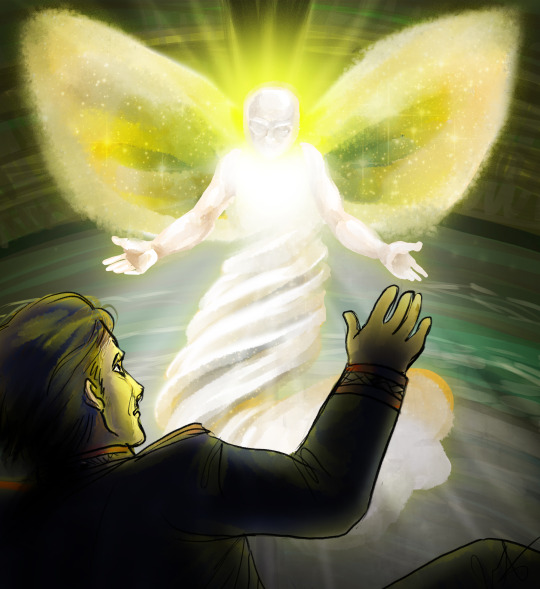
Babylon 5 rewatch Episode 2.22: The Fall of Night
Babylon 5 is at the center of not one but three conflicts as John Sheridan agrees to shelter a wounded Narn cruiser. The Centauri don’t like this. Earth doesn’t like this. The Shadows don’t like this. But Sheridan has a strong moral compass and what he doesn’t like is how much the institutions around him are willing to sacrifice in the name of forging some kind of cursory peace.
Things I liked about The Fall of Nighit
1, Lennier and Vir’s friendship. If you ask me Vir, could be friends with literally anyone. He’s such an understanding soul. Lennier is by nature a little judgey. More closed off. So when they sit down next to each other and discover how much they have in common both of them look at each other like “hello what” and automatically agree to meet again. But even this exchange is done almost like spies meeting and I don’t think we stop to think about that very often. These are the attaches of two ambassadors for two of the most powerful races in the galaxy… they could very well be exchanging state secrets instead of expressing solidarity for their equally frustrating jobs.
2, The Centauri are apparently willing to put their ships on autopilot and black out from g forces if it means when they come to they’ll be in a better firing position. This seems extremely reckless and VERY Centauri. It is the spacebattle equivalent of the hair. Big. Flashy. Not well thought through.
3, In the wake of the mass driver bombing, Sheridan gives Londo an opportunity to speak and Londo is like “NOPE” and jets before he says something that’s going to get him and his whole race in more trouble than they already are. Garibaldi then reads Londo like a literal book, delivering one of my favorite analyses of the character. Everyone thought Londo was a clown, indulging in opulence, going into debt at the casino, drinking himself to a stupor in public, but Garibaldi was his friend and knows that Londo’s not dumb, he’s actually very smart and his mind moves really fast. His error is in his judgment and priorities and he’s currently in waters he did not expect to tread. He’s scared, and he’s going to keep darting in and out of cover until he feels like he has a handle on things or he gets picked off by a hunter, whichever comes first. Also a very classic JMS line “He’s a pain in the butt, but he’s our pain in the butt.” Hunt for that or similar lines in other JMS stuff, he loves that line.
4, The ache of watching McCarthysim at work is very effective. Zach knows the guys he’s ratting on don’t deserve to be ratted on and even says so. “They’re just fooling around” but we can tell by the level of interest and tone of the Nightwatch captian’s voice that they’re gonna get blackballed. Zach can’t deny that they said what they said, but can tell that ratting them out is the wrong thing to do. In the end he relents with a bunch of qualifications but the Nightwatch doesn’t want qualifications. They want names. Thank you for your service.
5, I love that the guy there to ally with the Centauri is from the Ministry of Peace. So poignant. They’ll get peace all right, by paying off the aggressors.
6, When the Narn ship was coming under threat by the Centauri warship, Sheridan opened a line to Londo just to spit in his face and hang up. It was amazing. Also during this crisis, Sheridan whips out a law book to smack the Nightwatch guy back in his hole. Sinclair would be proud.
7, Watching B5 come under attack is so emotionally stirring. Even on a rewatch, I don’t want to see it hurt.
8, We have arrived! The scene where Kosh reveals himself. I love that G’Kar is hiding in the plants – like he’s not a huge gecko man who people are going to notice. I also love how plaintiff his voice is, thinking if he speaks on Sheridan’s behalf it’ll help him in the political shitshow he’s currently in. I mean he’s issuing this apology for helping a Narn ship and G’Kar is very very very grateful for that. Also B5 blew up a Centauri warship so he’s pretty grateful for that too, I mean come on… I like that B5 has like a standard subway system in the middle of it and that they let the Puppet Friends ride. I miss the puppet friends. I love that the rotational gravity system means there’s a weightless portion in the center of hydroponics and that we used that to our advantage in this story. Also the vorlons in their native form play on the perception of the lesser races. They are light beings, and humans see them as angels. The rest of the races see them as prophets or gods, but none of these perceptions are perfect. We see wings and white robes and think Angel, but Kosh didn’t appear like a rennaissance painting. He’s got a butterfly look to him, too. The face he wears is a facsimile of a human not an exact human. He’s not perfect, we’re just in awe. Love that.
9 And finally a lot has been said about why Londo doesn’t see anything when Kosh appears. He’s been touched by the Shadows, so he can’t be converted by the Vorlons b/c we’re playing a game of Othello today I guess. Maybe because he doesn’t actually believe in his pantheon of gods so he doesn’t have any deities to witness. Maybe he’s lying because what he saw was his own greed and vanity. The general consensus is the first – that he’s incapable of seeing the light because he’s in the dark. For a fresh take on it, let’s look at the Vorlons through this lens. Kosh said before that if he revealed himself everyone would know him… I take this as being a side effect of being Vorlon. Vorlons are a feeling not an image. Like Magenta. Magenta’s not a real color, it exists on the color wheel because something has to connect red and purple on the color spectrum… but the spectrum of visible light is actually a straight line. The wavelengths for red and purple are far from touching, but our brains can perceive when they’re both present, so Magenta occurs. It’s imaginary, but we see it for real with our eyes. That’s Vorlons. Perhaps Londo saw a shapeless light thing in the sky, perhaps that’s what Vorlons really are… or perhaps they have no visible representation at all until they hit our brains. Our eyeballs behold something, but our brains have to construct it out of pieces. When the rest of the galaxy looked at Kosh they used the color wheel to construct him, but Londo was only given the wavelengths. He saw nothing, because nothing was there to see. I really wish there was another Centauri there to be like “I saw the goddess Li welcoming me to her arms!” and Londo’s over there like “I’m the problem” instead of not really answering that question. Maybe it’s answered in season 3, I don’t know. Did Vir see anyone up there? He must have been on break.
What I like Less about 22
1, So here’s where I’m going to talk about Keffer. I know the origin story…. that he was an unwelcome addition to the cast added per network request, but who the hell is he other than that? I think its remarkable how he slips right out of my head the minute he is off camera. We know he’s a pilot, that he was close to Carlos (whose story/death you may recall I was laughing at in a previous episode because its significance ALSO came out of nowhere), and that he made friends with the GROPOS grunts (who we incidentally learned to care about enough in that one episode that we were sad when they died…. Awkward considering Keffer’s contribution to this episode…) Honestly the most interesting thing about him is that he’s got an old-timey fighter pilot scarf he wears and he believes in ghosts and I bet you all forgot about the ghosts. Honestly, the most interesting thing about Keffer is how he’s a lesson in how not to write an interesting character – and no shade on JMS for that, I know he did it on purpose. Significant things happening to a character does not automatically make them a strong character. Keffer experienced loss, came face to face with the shadows, got in fights… a lot of stuff happened to him, but he was almost always the only named character in those scenes. We cared about the GROPOS because they cared about each other and we responded to that. Keffer was there to play cabbage head and ask questions. He’s not tight with any of our main cast who we’ve had tons more time to grow attached to, and dies for plot reasons without leaving an impact with his loss. Heck, you can see the value of interpersonal relationships on character development in action when the show used a shoehorn to try and force some in in context to Carlos a second and a half before he died. We had him drinking at the bar with command staff suddenly, we had him die as a result of a flight mission Sheridan was part of to make Sheridan feel guilty about it. Everyone was standing around going like “No, Not Ramirez” and if you recall on my previous episode writeup I was LAUGHING at how tortured this sudden human connection was. Keffer could have been made interesting. Follow me on this.
My treatment on how to make Keffer interesting:
Let’s say Keffer was introduced as an old friend of one of our characters – Fraknlin let’s say. He was a friend from the Minbari War days that helped him sneak behind enemy lines. Perhaps he was complicit in the covering up and destruction of Franklin’s notes on Minbari anatomy. As a result, the two hang out in medbay sometimes, talking about old times and comparing the current war to the one they fought together. We learn that Keffer has a fire for justice. Hates bullies. Sees the strong as absolute defenders of the weak and that any stronger race picking on a weaker one is a bigger coward than the unvierse can hold. Then when Carlos gets killed by the ghost he starts researching what it could be. Kosh and Delenn tell him to stay out of it. The audience assumes he’s going to uncover something and bring Franklin and other characters into Delenn and Sheridan’s confidence about the shadows through curiosity and honor, but we’re learning through the episodes that the Shadows are IMMENSELY powerful and have no patience for flies. When he breaks off from his squad to go have a looksee at what he suspects led to his personal friend Carlos’s death, we know this is going to kill him. He ignores the warnings of those who have more awareness and dies to bring back evidence of the Shadows to the station. Sheridan recognizes how Keffer’s curiosity and sense of judgment led to recklessness, something Sheridan himself is prone to. He vows not to let Keffer die in vain, but also states that the proof he got has changed everything… and that Sheridan would have done the same. Killing your men in the name of a mission is never the goal but there’s a line everyone crosses when the safety of the universe is at stake and sometimes things are worth dying for. Franklin walks into medbay, casts a look to the counter where Keffer used to sit all those nights, and turns away.
But that’s not what happen. Keffer’s dead now and I don’t miss him. Glad he emailed the Shadows to ISN five nanoseconds before he died.
Babylon 5 is now the last best hope for victory because sometimes peace is another word for surrender and because secrets have a way of getting out. On to season 3!
#Babylon 5#babylon 5 rewatch#season 2#episode 22#babylon 5 spoilers#art#jenstoart#kosh#john sheridan
31 notes
·
View notes
Note
How would describe shameless to someone who never heard of it? How would you describe the specific characters?
I don’t know what I’ve done to deserve these super fun asks, but thank you so much! :D It’s funny that you sent this because I did actually describe the show to someone not too long ago, and I didn’t like how I did it in hindsight. I felt like I didn’t do it enough justice. So, I get a second chance to try again!
“How would you describe Shameless to someone who never heard of it?”
Shameless is a show about how life doesn’t always go our way, we don’t always do the right thing, and we’re all imperfect beings—but we still deserve a chance regardless. The Gallaghers begin the series nearly at rock bottom, doing anything they have to for their literal survival, but also to keep their family together. Sometimes that means supporting each other when they’re in a difficult spot, banding together to help their neglectful father even though he doesn’t deserve it, or even committing petty crimes to sustain their meager way of life. As they get older and have more agency in and control over their lives, the nature of their problems shifts, and they learn from their own mistakes rather than reacting to their parents’. The same trends unfold for the people and families in their orbit, showing that various trials and tribulations can impact anyone of any social standing. Not everyone gets a happy ending; not everyone gets what they want. However, they grow and learn how to manage both the hand that they’ve been dealt as well as the bed they’ve made for themselves. That, after all, is life.
Shameless is a “dramedy” where the comedy elements utilize primarily satire, which sets it apart from the popularity of slapstick and dry comedies over the last decade. By nature, the show therefore addresses difficult, uncomfortable, and controversial topics in manners and utilizing methods that are designed to make us laugh at the absurdity while forcing us to think about these topics in ways that we may have avoided otherwise. This format has been established since the pilot episode and certainly is not to everyone’s taste. I wouldn’t recommend this show to anyone who prefers that such issues be addressed with a deeper analysis on the part of the characters rather than the audience, which is the general tendency in drama pieces rather than shows of this genre.
“How would you describe the specific characters?”
For this, I’ll focus on the main Gallagher family, Kev, V, and Mickey, as they’ve been the constant presences on the show since the start. I’ll also keep it relatively short since I could write essays on each one, and that would bore anyone who hasn’t heard of Shameless (and 95% of those who have) to tears.
1. Frank Gallagher is the stereotypical “deadbeat” who plays the system for every penny so that he doesn’t have to work, choosing to fund his addictions rather than support his family. He will go to any lengths if it means preserving this lifestyle—mild, absurd, and even heinous. He functions as something of an anti-hero, being more a threat to the family’s stability in early seasons than a boon and gradually sinking into obscurity because of his children’s growing indifference as he burns one bridge after another with them. Frank prides himself on espousing only the values that will get him what he wants in a given circumstance. In specific instances, that has meant showing a measure of love and affection for his children that evidence has proven exists deep, deep below the surface. In others, he’s a wild card. Frank’s various fatal flaws have included arrogance, addiction, selfishness, and an avoidance of any and all responsibility.
2. Fiona Gallagher is the eldest and began the series as the rock of the family because, to put it simply, she was the only person able to do it. She selflessly cared for her younger siblings so that they wouldn’t be scattered into foster homes or adoption thanks to her parents’ neglect, even to the point where she gave up portions of her life and blurred the lines between her roles as sister versus caregiver, which became a sticking point in later seasons when her siblings didn’t need or want a mother-figure anymore. While Fiona was initially very responsible with regards to raising her siblings, she therefore sacrificed a lot of opportunities that were important for her development as a young adult and exhibited an immaturity typical of people her age that impacted other arenas of her life, especially relationships. As her role as caregiver dwindled, that immaturity and the norms prevalent in her environment became more pronounced with her newfound freedom, and she struggled greatly in the face of what she viewed as making up for lost time. Fiona’s various fatal flaws have included ambition, a “martyr complex,” and viewing her family as an impediment to her ambitions later in life instead of a support system.
3. Lip Gallagher is the oldest son. He began the series with a hefty chip on his shoulder. Intelligent, quick-witted, and calculating, Lip was constantly referred to as a sort of diamond in the rough and clearly came to believe it. This led to a very fascinating dynamic within the family and his other interpersonal relationships as his love for and desire to protect his family was balanced by a sense that his way was the best way—the only way, really. A combination of poor choices and unfortunate circumstances beyond his control resulted in a very real “fall from grace,” by South Side standards, and Lip has worked hard to claw his way back from where he was in the middle of the series. Where Fiona spiraled further as she withdrew from her family, Lip leaned on them and others in his support system—and it saved him. Lip’s various fatal flaws have included arrogance, contempt for power structures in which he is not at the top, and trying to solve other people’s problems at the expense of dealing with his own.
4. Ian Gallagher is the middle child and something of an outlier in his own right where his family is concerned. He began the series seeming to have his shit together: he balanced school, ROTC, and work, excelling in all three at just fifteen years old. He was plagued by his status in the family at times, not old enough to have more control over his situation while not young enough to shrug off a lot of it on Fiona and Lip, and wanted something for himself more than anything. It’s that combination that put him in an extremely vulnerable position, because while he was the picture of responsibility and didn’t orchestrate as many scams as his siblings (though he was involved in plenty—he is South Side and a Gallagher, after all), it gave him—and his family—the false impression that he was more mature and in control than he was. Multiple older men preyed on him because of that, and in his thirst to find something that was solely his and someone he could care for outside his household, he viewed them as relationships rather than abuse. Like Lip, Ian truly hit rock bottom in a different manner, although the causes of his descent were more heavily skewed beyond his control. In true Ian form, however, he remains driven to find the straight and narrow—and stick to it as much as he can. Ian’s various fatal flaws have included ambition, a “hero complex,” compartmentalizing to the point of narrowmindedness or naïveté, and ignoring his own needs in pursuit of fulfilling others’.
5. Debbie Gallagher is similar to Lip in that she has always been clever, cunning, and driven to get what she wants. Debbie began the series in a difficult position, going to school and contributing to the household while ultimately not in control of anything that was going on. From the start, all she wanted was a functional family, and it colored her behavior throughout the first six seasons of the show. In many cases, that meant doing whatever she could to hold everyone together: investigating Fiona’s lying boyfriend, running a daycare so that Fiona could work all night and still find time to sleep, prompting Fiona to more actively worry when Ian ran away and helping Lip locate him, and caring for Liam a lot of the time while he was a baby. Over the years, as the dysfunctions racked up, she sought an escape through boyfriends and a baby of her own. The means by which she attempted and ultimately failed to achieve these goals were at times reprehensible and spurred on by both her immature ignorance and the culture in which she was raised. Debbie’s various fatal flaws have included self-centeredness, envy, manipulative tendencies, and not thinking or caring about the implications and consequences of her actions for herself or the people involved.
6. Carl Gallagher began the series as a real mess. The word “sociopath” comes to mind. He was the stereotypical “wild child” whose behavior embodied the dysfunctional nature of the family and their environment. He destroyed toys for fun, tortured animals, physically bullied children at school, and was held back multiple times for poor academic performance. Carl was never as academically bright as the other Gallagher siblings, but his street smarts were nigh unparalleled and, like Lip, he could probably survive anywhere. Over time, Carl underwent a remarkable transformation: embracing the negative stereotypes of his environment, he dove towards rock bottom with gusto only to realize that the thug life isn’t all it’s cracked up to be. Once again, he paralleled Lip and Ian’s trajectory in leaning on his family when it became too much, and he’s turned his entire life in the opposite direction to pursue a path that he hopes will lead to helping people rather than hurting them for his own gain or reputation. Carl’s various fatal flaws have included lack of foresight, a penchant for violence, and ignorance.
7. Liam Gallagher is still very young and therefore tougher to fully characterize as his development isn’t as extensive. Right now, he’s the same age Debbie was when the show began, and we’ve seen just how far she’s come. So, for the time being, Liam is extremely bright and has grown up with a great deal more privilege than his siblings. He doesn’t remember saving for the squirrel fund with fears of not being able to eat all winter in mind. He doesn’t remember what it’s like to worry about Frank or Monica’s actions having an enormous and lasting impact on them. He doesn’t remember Lip dropping out of school and moving out of the house, Monica’s actions at Thanksgiving, Fiona crying over crumpled bills from working at the sport bar, Ian going missing for four months and coming home a different person, or Debbie lying about Patrick just so they could keep a roof over their heads. Liam didn’t grow up with those things, and so he has the luxury of being a kid a bit more of the time. However, because his parents aren’t around and Fiona left the house a long time ago despite being his guardian, he has matured quickly in lieu of any real supervision.
8. Kevin Ball and Veronica Fisher have been the Gallaghers’ closest allies in the neighborhood all this time. Kevin isn’t the brightest academically or in terms of common sense, but he has a good heart and makes the best decisions when he uses it. He has been through a lot, between foster care as a kid, a crazy ex-wife, trying to keep the Alibi afloat, and raising twin daughters that they definitely didn’t have the means for when they discovered that they were expecting two kids. And Veronica… Well, she’s quite literally his other half. She’s savvy and smart, intelligent and assertive—they complete each other. They began the series as an established couple experiencing some growing pains, especially when Veronica was giving the Gallaghers everything from use of their shower to their toaster while Kevin insisted that they needed to focus on themselves before they could help Frank’s kids. (He talked a good game, but when the chips are down, Kevin has always been there for them too.) They’re good people who’ve been given a few bad shakes and taken a few wrong turns, but their love for each other, their kids, and the Gallaghers has made them a surprisingly strong heart of the show. Kevin’s various fatal flaws have included lack of foresight, ignorance, and not standing up for himself. Veronica’s various fatal flaws have included avoiding communication about her feelings and indecisiveness.
9. Mickey Milkovich is the stereotypical personification of their environment. He began the series as a poor thug—and a dirty one, at that—who exuded such a presence in the neighborhood that he instilled fear at a mere glance. His family functioned as a foil to the Gallaghers, perhaps what they would have been if Frank had been a different person or they’d fallen even further. Mickey didn’t benefit from an emotionally supportive family that banded together to provide for more than merely monetary concerns, not to mention that his father was openly and violently homophobic, so it took a great deal of time and overcoming numerous internal and external hardships for him to come to terms with who he is on many levels. Over the years, Mickey was self-employed or acted with his family as a drug dealer, a pimp, and a prison hitman; worked for a drug cartel; and has engaged in any number of other scams and illegal activities in order to make ends meet—and he has been quite happy to keep doing so as it plays to his strengths. Mickey is remarkable, however, because he has always been a multifaceted character whose problematic decisions, abrasive mannerisms, and questionable lifestyle didn’t and don’t negate that he cares very deeply and will do literally anything for the few people he allows to get close to him, specifically Ian. Mickey’s various fatal flaws have included lack of foresight, avoiding communication about his feelings, and not reaching out for help when he needs it.
~*~
That was quite a bit longer than I initially intended, but I had a great time putting this together. Thank you again for the ask!
59 notes
·
View notes
Text
SnK Episode 70 Poll Results (for Manga Readers)

The poll closed with 170 responses. Thank you to everyone who participated!
Please note that these are the results for the Manga Readers’ poll. If you wish to see the results for the Anime Only Watchers’ poll, click here.
--
RATE THE EPISODE 167 responses
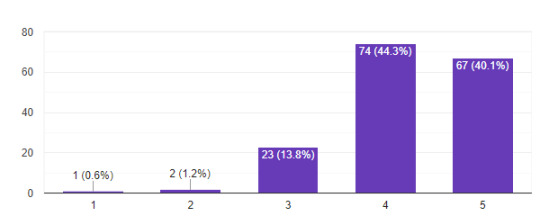
This episode received good ratings, though it wasn’t as hype as previous episodes have been. We presume this is likely due to the primary focus on Gabi and Falco over the Survey Corps/Warriors. Overall, though, the episode was solid for most respondents.
Beautiful😍✨
MAPPAGOAT
Its pretty good
Alright for what it was.
WHICH OF THE FOLLOWING GABI AND FALCO MOMENTS WAS YOUR FAVORITE? 167 responses
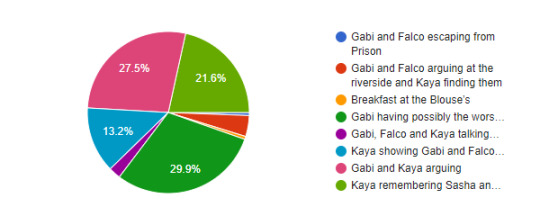
The majority of the most favored Gabi/Falco moments from the episode were in the second half, starting with Gabi’s unfortunate encounter with the horse with 29.9% of the vote. Behind that is Kaya and Gabi’s argument about why Kaya’s mom had to die with 27.5% of the vote. At 21.6%, Kaya remembering Sasha was favored and at 13.2% was Kaya taking Gabi and Falco to her old home.
Gabi's character is so real. LOVED her and Kaya's argument; the va's went all out & it made me cry
Why do ask us what our favorite Gabi/Falco moment was without the option "I don't have one?" Falco's cool and all but Gabi's story has literally been nothing but a drag to me from start to finish
Would have chosen the horse thing for my favorite moment but went with Kaya remembering Sasha instead. At this point so close to the end of the manga I'd rather focus more on moments with characters I enjoy than obsessing with a character I utterly despise having some misfortune (to put it mildly)
WHICH OF THE FOLLOWING MOMENTS FOCUSING ON OTHER CHARACTERS WAS YOUR FAVORITE? 168 responses
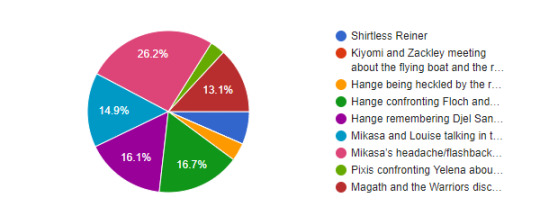
This pie chart was a bit more colorful than the previous one, with the largest piece going to Mikasa’s headache with her flashback to the night Eren saved her (26.2%). Behind that moment, 16.7% most enjoyed Hange confronting Floch and Co. about their involvement in leaking information about Eren, 16.1% favored seeing Hange remembering Sannes’ warning. 14.9% liked seeing Mikasa and Louise’s brief conversation in the dungeon and 13.1% liked the moment with Magath and the Warriors discussing their retaliation.
GIVE HANGE A BREAK </3
WHICH FLASHBACK HAD THE MOST EMOTIONAL IMPACT FOR YOU? 169 responses
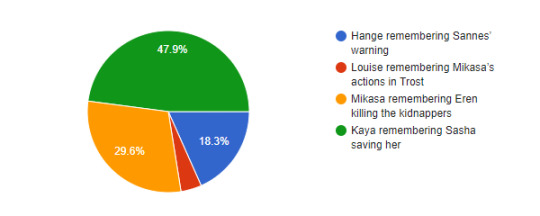
Nearly half of respondents were most touched by the moment at the end of the episode where Kaya talks about Sasha saving her and says she wishes to become a person like her. 29.6% got most emotional over seeing the flashback to the night Eren saved Mikasa, and 18.3% were most impacted by Hange remembering Sannes’ warning.
RATE JEAN’S OUTFIT 169 responses
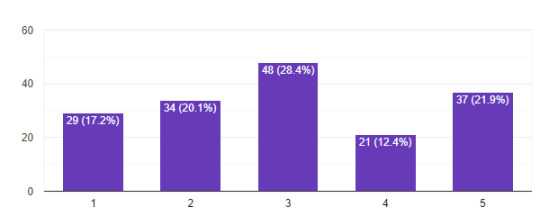
Jean doesn’t do anything in this episode really, but he sure did come dressed in, erm, a unique outfit. Overall most people were neutral or felt that he needs to up his fashion game. Although 34.3% altogether ranked on the higher end, feeling he’s a total fashion icon. We’re questioning the legitimacy of these claims or whether they were just being sarcastic for the fun of it. lol
WHO WERE YOU MORE EXCITED ABOUT TO SEE SHIRTLESS? 159 responses
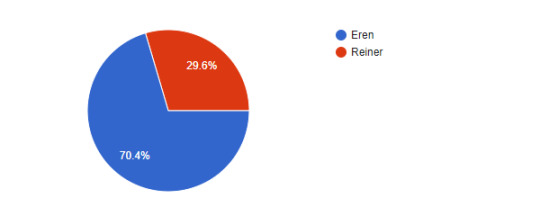
Eren thirst won out on this question, with 70.4% being most excited to see his half naked body in the previous episode. Though Reiner stans came through for him in their support of his shirtless moment this week with nearly 30% of the vote (and commentary).
Poundtown
More half naked Reiner thx
My only disappointment is that the shirtless reiner scene wasn't longer.
WOULD YOU LIKE TO HAVE AN EXCUSE TO TALK TO YELENA? 169 responses
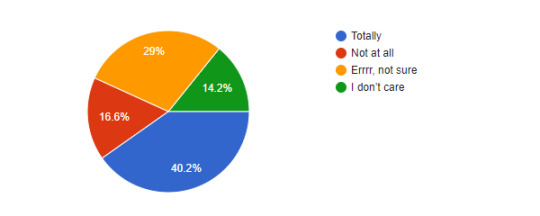
When asked if respondents would like an excuse to have a conversation with our chaotic bae Yelena, 40.2% said they would absolutely love a reason to talk to her. 29% aren’t sure if they would want to or not, while 16.6% were a solid “no.” 14.2% didn’t care about this question.
Yelena is hot
AS ALWAYS, WE’RE GONNA ABOUT CUTS. MAPPA LEFT OUT FALCO’S THOUGHTS ABOUT IT NOT BEING THE RIGHT TIME TO TELL GABI HE DELIVERED EREN’S LETTERS. THOUGHTS? 165 responses
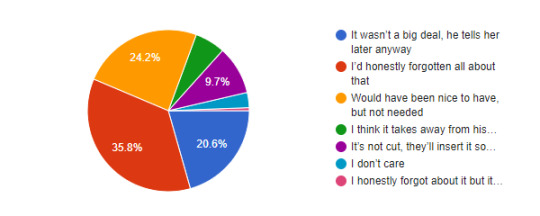
There was a brief moment in the manga after Gabi’s misfortune with the horse where Falco thinks to himself about how he’s not yet ready to tell Gabi about his involvement in Eren’s attack on Liberio. 35.8% had completely forgotten this was a thing at all, while 24.2% felt it would have been a nice thing to keep, although ultimately unneeded. 20.6% feel it wasn’t a big deal since he tells her later anyway, and 9.7% feel that this thought of his will come up at a later time.
I honestly forgot about it but it would have been really cool to see his thoughts in a better way, if that makes sense.
MAPPA ALSO CUT THE BEGINNING OF PIXIS AND YELENA’S CONVERSATION WHERE HE ASKS HER ABOUT HER CELL, TO WHICH SHE RESPONDS IT WOULD HAVE A BETTER VIEW WITHOUT THE BARS. THOUGHTS? 165 responses
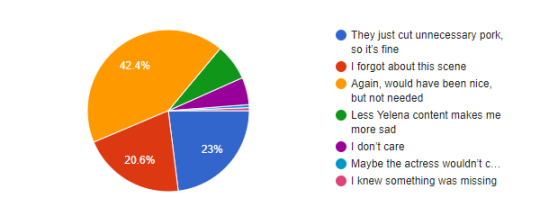
Though a small detail, a few lines were cut from Pixis and Yelena’s conversation as well. 42.4% feel that it was unneeded and feel ok with the cut. 23% thought it wasn’t necessary to begin with, and 20.6% had completely forgotten about this as well. A handful didn’t care or feel saddened by less Yelena content.
Maybe the actress wouldn’t come in to say one line l idk
I knew something was missing
HOW DOES IT FEEL GETTING TO RELIVE GABI’S EARLY CHARACTER DEVELOPMENT AGAIN? 167 responses
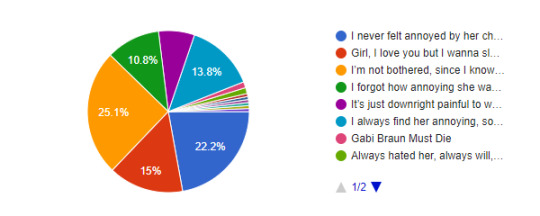
We get to reexperience Gabi’s evolution from a perpetuator of Marleyan propaganda to someone who learns to “understand Reiner’s feelings” and see that those she was taught to hate are just like her. 25.1% of respondents feel unbothered by her initial resistance to see things any other way as they know where her arc is headed. 22.2% were never annoyed by this facet of her character to begin with and are totally enjoying the ride. 15% love her but can’t help but feel frustrated by these early moments of her development. 13.8% have always felt annoyed by her character and so their feelings remain unchanged, and 10.8% simply stated that they had forgotten just how annoyed they felt by her at all in the early portion of this arc.
It's annoying AF but looking back/knowing what I know now makes me more empathetic to her storyline. She still annoying AF rn, though.
Back then I was just antsy to get back to the other plot lines. But I’m enjoying this a LOT more this time around.
It's a mix of painful and Gabi I love you but you need sense knocked into you, ya know?
Always hated her, always will, nothing the anime does changes my hatred of her
To quote Eren, "I always hated you".
I feel bad for her, she doesn't deserve this
She’s so annoying but I found Eren just as annoying in the beginning and I grew into loving the character. The get the reasons for her character but boy yams really made her so fucking annoying
Gabi Braun Must Die
HOW DO YOU THINK GABI’S BELIEFS WOULD HAVE DEVELOPED HAD SHE BEEN THE ONE TO MEET EREN INSTEAD OF FALCO? 168 responses
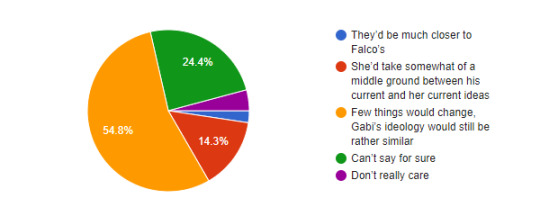
The majority has spoken. 54.8% feel that if Gabi had been the one to encounter Eren at the hospital, her views would have mostly remained the same, as opposed to Falco who was probably a better person to put into that role narratively speaking. 24.4% don’t want to say for sure as there is no way we will ever know, and 14.3% feel that she would have had her views altered to a slight degree, but would still not have been as empathetic to Eren as Falco was.
DID KAYA TALKING ABOUT WANTING TO BE LIKE SASHA HAVE MORE EMOTIONAL IMPACT ON YOU WHEN INITIALLY READING IT IN THE MANGA, OR IN THE ANIME? 168 responses
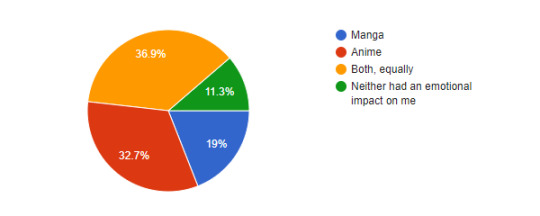
Overall, the anime had a profound effect on the emotions of the audience. 36.9% state that they were equally impacted in both mediums, though if a side was chosen, 32.7% felt that the anime made the scene more impactful, versus only 19% who thought that Isayama nailed it better in the manga. Only 11.3% were unaffected by this scene in either medium.
PORCO AND PIECK GOT ADDED DIALOGUE IN THE ENDING SCENE, ARGUING THAT THEY MUST RETRIEVE GABI AND FALCO DUE TO THEM BEING VALUABLE WARRIOR CANDIDATES, AND THAT IT WOULD TAKE YEARS TO RETRAIN A NEW BATCH. WHAT DID YOU THINK OF THIS INCLUSION? 167 responses
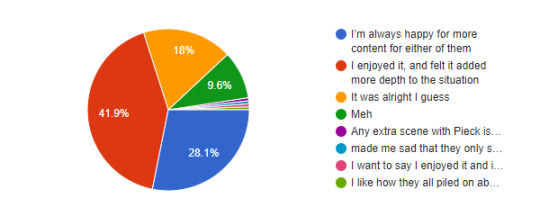
MAPPA included dialogue of Porco and Pieck vouching for saving Gabi and Falco ASAP, arguing that they should get them for the sake of the warrior program and that losing their talent would be a blow, and it would take ages to train up new warrior candidates. This is most likely just their excuse to appeal to Magath while wanting to save Gabi and Falco because they care about them. 41.9% felt that their commentary added more depth to the situation and the urgency to retaliate against Paradis and get Gabi and Falco back. 28.1% were simply content to get more content of them. 18% weren’t super excited about it, just stating that it was alright, while 9.6% just felt “meh” about the addition.
I like how they all piled on about the need to take immediate action
I want to say I enjoyed it and it added depth but thinking about it longer makes it sound like they only care about rescuing them only because their valuable warrior candidates. Like, it makes it seem like they don't actually care that much about them, even if I know that's not the case. LOL
Any extra scene with Pieck is much appreciated!!
made me sad that they only see them as soldiers and not kids that need saving.
WHICH MOMENT FROM THE PREVIEW ARE YOU MOST LOOKING FORWARD TO? 165 responses
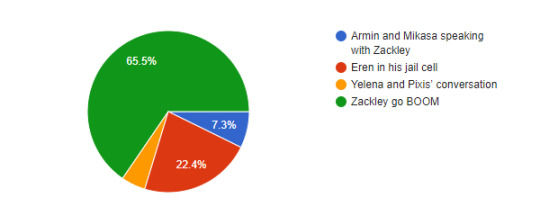
The vast majority (65.5%) of manga readers are most excited to see Zackley blowing up in the anime (bye bye, poop machine!). At a distant second was seeing Eren his cell at 22.4%. Only 7.3% are looking forward to seeing Mikasa and Armin pleading with Zackley to see Eren, and Yelena and Pixis got minimal love.
My memory is not working well, did Wit showed Zackleys poop machine or was it supposed to be shown in the next episode?
WE GOT CONFIRMATION THAT EPISODE 16 OF THIS SEASON IS GOING TO END ON CHAPTER 116. THOUGHTS? 159 responses
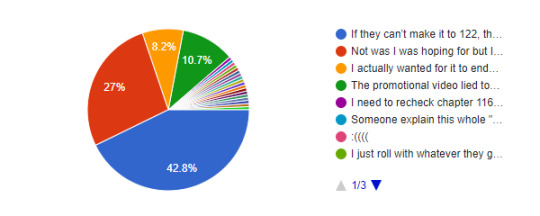
The plurality of respondents (42.8%) seemed a bit disappointed, but had no problem accepting this cliffhanger. 27% seemed rather displeased, but nonetheless were also understanding of MAPPA’s decision. In contrast, 10.7% looked back to the Promotional Video (which had content from up 122) and expressed their PAIN. 8.2% actually wanted the season to end on this cliffhanger, so they were rather pleased instead. We also received a lot of write-ins.
There absolutely needs to be season part 2, i don't accept any early endings
I am... not sure yet.
As long as it means less cut content lmao
Don't really care much where it's gonna end. I just hope the pacing is good.
i read it ages ago idek which chapter 116 is
I want people to stop complaining about the trailer “lying to them”. Also my anime only gf is going to be very frustrated with where episode 16 ends.
I thought it would end with 122 according to the preview and it would have been, IMO one of the best cliff hanger ever since all the logic of the plot turns around with revelation about Eren path shenangians. However, I think it's really fine since it allowed MAPPA to take its time to show us the story without making to much choices or compromise. It also means longer s4 part2 if there's one.
I dare you to stop at chapter 114 and fluster up all Levi fans
I am going to die waiting for Paths.
I need to recheck chapter 116 I forgot about almost everything happened after ema encounter in 112 :D
I don't care as long as they all cover it eventually.
Chapter 119 would have been a better end, but well, I'm gradually learning to lower my expectations for this season
I just roll with whatever they give me xD only fearing Hange's farewell </3
:((((
both 122 and 116 are okay for me tbh
It's all fine to me
Someone explain this whole "ending on chapter 116" thing please
It should've been 117 :/
I was hoping for 119, but I get why they picked 116
WHAT ARE YOU MOST HOPING FOR AS A CONTINUATION? 169 responses
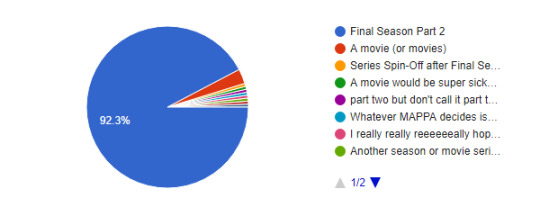
In a nearly unanimous vote, the large majority of respondents feel that the series is best wrapped up with a “part 2” of the final season over the potential for MAPPA to conclude things as a movie (or as movies). Hopefully we’ll have an answer from MAPPA on this front at the end of this run. :)
Another season or movie series works as long as they keep to the source material
I’m happy with either.
I really really reeeeeeally hope it's not movies. I do not want movies! It would take literal years for fans outside of Japan to get a proper conclusion to the series. Last time people waited years for a season so many people stopped caring, moved on and the popularity took a huge hit it never recovered from. I'm worried that due to Demon Slayer's success they're gonna get greedy but SNK movies wouldn't even make a fraction of what Demon Slayer made. That series is a behemoth over there, it's insane. And I love SNK but Evangelion it is not, and people aren't going to wait and will lose interest. Just please, NO MOVIES!
Final Season Part 2 BUT with lots of time to adapt it
part two but don't call it part two XD.... let's stay in a hiatus for an anime season or 2. or more i don't care , i hope they have enough time to make the amazing job they are doing right now :)
Series Spin-Off after Final Season Part 2 !!
A movie would be super sick but unrealistic
Whatever MAPPA decides is best
ADDITIONAL THOUGHTS ON THE EPISODE?
The scenery is a 10/10
gabi braun and the terrible, horrible, no good, very bad island vacation.
Gabi sucks
All hail the Eldian Empire
I thought it was overall really good and funny because of the scenes where falco and gabi were just arguing,, it didn’t have much blood and all but I still really liked it!
I never noticed this in the manga, but seeing gabi constantly almost give them away and falco anxiously making up excuses felt like watching reiner and bert again 😂
Gabbbiiiiiiiiiiiiiiii!!!!!! Kaya MVP btw.
Bless MAPPA for delivering on the shirtless scenes after we got robbed in Season 3. lol :p But seriously, this episode's scenery was gorgeous.
It was like the calm before the storm that's about to come with the next episode. Episode 71 will be when everything starts to violently turn
people should understand Gabi's character even more
I think Falco was very cute the whole time
Gabi beating that guard was way more brutal in the anime, but the scene of her slapping Lisa's hand away was badly done here.
It was a bit boring, but it was needed for character development
One thing I noticed about this episode is how heavily it featured female characters being influenced by other female characters/female characters in general (Louise and Mikasa; Kaya and Sasha; Kaya and Gabi; arguably Hange depending on how you identify them) which was a nice reminder that of the fact that AOT isn't one of those shows that falls heavily in the 'one token girl' dynamic. Isayama worked to include a wide variety of female characters with very differing outlooks, which clash occasionally, without it ever being about romance.
Like most of this season (except episodes 1 and 7 maybe), I appreciate Mappa's work but that's all. I'm sad, disappointed, and I guess it's a good thing this season will end on chapter 116. Let's hope they will have enough time to adapt Part 2 and make it legendary, because this first part is good at best. Also, I totally forgot how annoying Gabi was back then. I really like her now, but geez, she was awful this episode.
Felt good to see Gabi get horsebite all over again. Can't wait to see how MAPPA extends Nicolo punching her lol
cool episode, i’m looking forward to seeing more of gabi’s development in the future episodes :))
The horror of mikasa's newly resignified memory... PERFECT. i was fearing they would use wit's romanticized scene... which worked just fine in the first season BUT NOT NOW! because the whole connotation of the memory is different. ALSO! the scenery was insane!
Horse for President!
Damn, MAPPA's killing it on the scenery this episode. I really enjoyed the animation as well as the plot and voice acting.
In spite of the animation quality I had to give it an obligatory 1 because it was a Gabi episode, and anything involving Gabi automatically decreases the overall quality of the story
WHERE DO YOU PRIMARILY DISCUSS THE SERIES? 156 responses
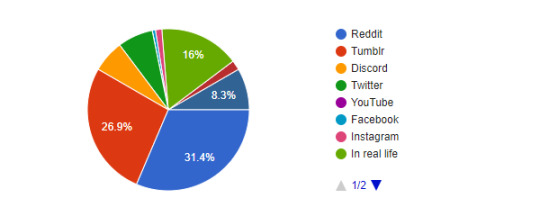
Thank you again to everyone who participated!
8 notes
·
View notes
Text
The Princess Bride: The Characters, Part 1: Introduction, Westley, and Buttercup
As easy as it might seem, as it turns out, writing a fairy-tale for the screen can be rather challenging, especially in terms of what might seem to be the ‘easiest’ part: the characters.
In most legends and fairy tales, characters aren’t really people, they’re archetypes, designed to be described in one word so that the audience understands immediately everything they need to about the character: the Knight, the Princess, the Dragon: clearly divided into ‘good vs. evil’. From a scriptwriting perspective, or indeed, a writing perspective in general, this is a terrible idea.
When the story you’re writing is focused less on the characters and more on the plot, you can run the risk of making your audience not care about the characters themselves. By focusing your emphasis on what the characters are doing, instead of who they are, you remove the main thrust of most stories: character growth, and turn it into something else: good vs. evil, heroes vs. villains. In most fairy tales, there really isn’t a lot of variety or development built into the characters involved, since the characters more or less exist to give the audience someone to root for, someone to root against, and, most importantly: to move the plot forward.

While not impossible, the fact is, it’s very tricky to make your characters true fantasy generic ‘archetypes’ and still create genuinely interesting characters. The Wizard of Oz managed it by infusing a few twists, such as a protagonist from the ‘real world’. Ladyhawke told the story not as a fairy-tale, but as normal people trapped under a fairy-tale curse.
At first glance, it seems like The Princess Bride didn’t do either, and instead, did what seems like one of the worst ideas: played it straight.
The Princess Bride seems to delight in its use of traditional fantasy archetypes: the damsel, the evil prince, the hero, the wizard, true love, etc. Instead of subverting these tropes or twisting them in some way, The Princess Bride embraces the simple ideas that these characters are founded upon, and proceeds to use the tropes as a playground, fully using the fantasy archetypes to craft a story that somehow manages to keep these ‘blank slate’ characters fresh, interesting, and unique, despite their clear fairy-tale blueprint.
Today, we’re going to be taking a look at these traditional fantasy characters, starting, of course, with our Hero: Westley. Spoilers below!

Westley doesn’t quite fit the mold of your typical ‘fantasy hero’ right off the bat: he’s no knight in shining armor, that’s for sure. There’s little of the Luke Skywalker ‘white knight’ to be found in the character of Westley, rather, he actually fits the bill of a different kind of fantasy hero: the swashbuckler.
Cary Elwes’s portrayal of Westley actually has a lot more in common with Errol Flynn’s performance as Robin Hood from The Adventure of Robin Hood in 1938, as well as a healthy dash of various portrayals of the character of Zorro. (Elwes would actually go on to play a parody of Flynn’s Robin Hood in the film Robin Hood: Men in Tights in 1993.) He’s the Ace, stronger than the film’s giant, more skilled than the Spanish swordsman, and more intelligent than the leader of the band of kidnappers who dared to abduct his true love. Cary Elwes portrayed the hero of The Princess Bride as dashing in an old-fashioned, ‘30s movie-serial kind of way with a wit sharper than his sword. Westley is intelligent, cool-as-ice, and formidable, but above all, he’s also dedicated to the love of his life, and funny to boot. Much like Errol Flynn’s Robin Hood, Westley possesses an incredible audacity and humor that allows him to fence with focus and a quick-quip for each strike.
All of this makes Westley an engaging character to watch, but there are a few elements about his character that actually allow him to delve a little deeper than a simple surface swashbuckler.

Starting with the duality of the character.
For all of The Princess Bride’s straightforward fairy-tale nature, there’s actually a fair amount of subversion and deception on the part of many characters, and Westley is no exception.
When we first meet Westley, when he’s first described at the very beginning of the story, he is a simple Farm-boy, a traditional fantasy-figure. He isn’t given much screen time, or much personality, for that matter: we know very little about him besides the fact that he is very much in love with Buttercup, and demonstrates it with the phrase ‘as you wish’. Still, what little we do see of him doesn’t seem to indicate any piracy tendencies, or even much in ‘adventurer’. He’s a poor, simple farm kid, and we know just enough about him to feel sorry when he is apparently killed by the Dread Pirate Roberts.

When Westley reappears as the Man in Black, under the alias of the Dread Pirate Roberts, it throws the audience and Buttercup for a loop.
Westley’s character post return is best characterized by being the Master of All: good at everything, smart, funny, witty to boot, with a “Dark is Not Evil” color palette. He’s the Guile Hero, the Knight to Buttercup’s Lady, possessing Nerves of Steel, becoming a Living Legend, a Legacy Character by taking on the name of the Dread Pirate Roberts.
Westley is, for all intents and purposes, supposed to be our main protagonist. After all, he gets the girl at the end, he’s the hero, the leader, the best at everything. He’s gotta be the main character, the laws of fantasy and fairy-tales dictate it!
And yet, he doesn’t exactly fulfill the role of the protagonist in a usual way.

Early on, the audience, and Buttercup, is led to believe that he’s dead, right after he makes the very Fantasy Protagonist decision to leave his farm and seek adventure. After this change, the story’s perspective, which was already focused on Buttercup to begin with, fixes on her entirely. The audience has no other ties to any other characters, so they happily follow Buttercup throughout the story, as she’s engaged, kidnapped, and rescued by another kidnapper: Westley in disguise.
At this point, our apparent protagonist, who, in personality and position within the story, is everything a fairy-tale protagonist should be, now takes a center position. It is here that the story’s focus shifts again, splitting between the two characters, and even adding one more: Inigo Montoya (I’ll get to him in a minute). Later, Westley is even killed, again sitting out a large portion of the action, and even when he is revived, he is weakened to the point where he can’t engage in a climactic finale, rather just intimidating Prince Humperdinck into defeat. He doesn’t manage to actually participate in a fight at all, just coming up with the plan in order to get into the castle in the first place.

No, the action is instead left to Inigo. (Again, more on him in a minute.)
Oddly enough, Westley spends most of the film out of commission, or not directly involved in the action. He doesn’t propel the story forward, and he doesn’t even manage to take part in a final climactic battle. Except for his personality traits, he doesn’t really seem like he belongs in the part of the protagonist.
If it weren’t for our ‘criteria question’, it seems very unlikely that he’d even be considered the protagonist in the first place.

Like I’ve said before: Every protagonist should have a problem, preferably a problem pertaining to the plot, and in the case of Westley, that problem seems pretty simple: he’s been separated from his true love, Buttercup.
Typically in stories, the protagonist is the character who faces the central challenges and conflicts within the story. They are the character with the main goal that ties into the main story. It is they who are chiefly inconvenienced by the antagonist’s actions, actions that directly interfere with the protagonist’s attempts to achieve their goals. It is the protagonist that makes choices that lead to major, plot-important consequences, and it is the protagonist that undergoes a transformation of beliefs and personality, growth, as a result of the events of the story. In other words, you can determine who the main character of your story is by determining whose story it is.
And in the case of The Princess Bride? Westley is the one who makes the decision to pursue his fortune, who searches for Buttercup, which seems to place him pretty firmly in the position of the protagonist. He does grow from simple farm boy to pirate hero by the end of the story, and Humperdinck’s actions seem to directly get in the way of his goals.

In fact, it seems like Humperdinck’s actions seem to affect him the most drastically out of every character in the story: except for Buttercup herself.
Buttercup is the Lady, the quintessential Damsel in Distress that’s necessary in fantasy stories. She represents an ideal, the ‘fairy-tale’ fairest-in-all-the-land archetype that so many stories seem to require, and, on a first viewing, it seems like that’s…all she is.
Buttercup doesn’t seem to possess the remarkable amount of personality that the rest of the cast seems to be overflowing with. She’s not particularly funny, or smart, or strong, and she doesn’t have any greatly interesting lines or moments. She’s very bland, actually, and doesn’t seem to do a whole lot of active action throughout the story.

Unlike Dorothy of The Wizard of Oz, Buttercup doesn’t do a lot to get herself out of her various circumstances. She seems to do nothing but occupy the Neutral Female role: a series of Job Titles. Even the name of the film is her title: The Princess Bride. Despite this, she is presented as a Decoy Protagonist Ice Queen, early on in the story, as she falls in love with Westley and he leaves, only to be slain on the high seas.
From that point on, Buttercup declares that she will never love again, and proceeds to be passed around for the rest of the story: chosen to be Humperdinck’s bride, abducted by Vizzini and his gang to be used to start a war, pursued as a piece of stolen property by Westley, before she is recaptured by Humperdinck once more, where she decides to wait for Westley to come get her again, attempting to kill herself when he doesn’t at first, which, admittedly, is the only choice she has left to her by then.
There are a few escape attempts, and Buttercup does manage to push Westley (who she thinks is the Dread Pirate Roberts) down a hill, but overall, aside from a few ‘Reason You Suck Speeches’ aimed at Humperdinck and a deal she makes with him to spare Westley’s life if they surrender (which he ignores), Buttercup is a passive character. Her life is entirely out of her hands, and the choices that she does make hold no lasting consequences on the plot at large.

Despite the fact that Buttercup receives quite a bit of focus, it really doesn’t seem like she fits the ‘protagonist’ bill. After all, protagonists have to make choices, and although Buttercup does have a plot-relevant problem (she thinks her true love is dead, and she is being forced to marry someone she doesn’t love, who’s a murderer to boot), she doesn’t do much about it, instead getting passed around like a fancy lampstand. Much like ‘The Maltese Falcon’, she is almost a MacGuffin, an object that propels the story along because everyone is after it/her.
But…perhaps I’m being a bit too hard on her.
After all, Humperdinck’s plans to marry Buttercup and then kill her have the most to do with interfering with Buttercup herself, not Westley.

Throughout the story, Buttercup is the focus of both Westley and Humperdinck, (the main antagonist) and it is her life that is in danger for the duration of the movie. She is at the center, the heart of the story by being Westley’s true love, and in a sense, the story and the events are hers. She is, after all, the Princess Bride, and she too grows: defrosting from her cold nature and allowing herself to feel hope and love again by the end.
With this line of logic, it seems like the two lovers almost ‘split’ the role of protagonist between them. But even with this central role divided between the two romantic leads of the story, there are still gaps left: huge chunks of decision making, plot-driving, and growth to be done, with no characters available to do so. With Westley imprisoned, absent, or Mostly Dead and Buttercup captured, who is left to move the story forward?

Thankfully, The Princess Bride has no shortage of supporting characters. It’s time to talk about Inigo Montoya.
(Join us next time for Part 2: Inigo Montoya, Fezzik, the villains, and the conclusion!)
#The Princess Bride#The Princess Bride 1987#1987#80s#Adventure#Comedy#Fantasy#Family#Romance#PG#Cary Elwes#Robin Wright#Mandy Patinkin#Chris Sarandon#Christopher Guest#Wallace Shawn#André the Giant#Peter Falk#Fred Savage#Rob Reiner#Film#Movies
19 notes
·
View notes
Text
The Five Worst Things About Digimon World
I did it.
It took 20 years but I did it.
I finally beat Digimon World for the Playstation 1, a game that has haunted me for most of my lifetime, and I did it with a Phoenixmon, the reason why I use “Turquoisephoenix” as a handle!
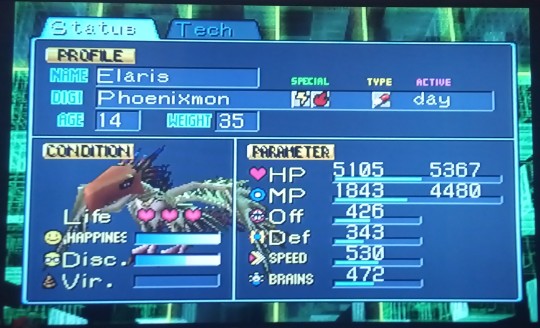
This is who I used to beat the game, named after an obscure Ratchet and Clank character because that’s just how I roll. The final boss battle involved a lot of Prominence Beam spamming and med recovery floppy spamming but I did it fair and square.
Before I get into what I thought about this game as a whole - and I do have a lot of good things to say about this game since I obviously enjoyed it enough to get to the end - I gotta talk about my least favorite things about this game. In a concise, Buzzfeed-esque list because I like writing things in easy to digest chunks.
Because, like most charming yet difficult games of the late 90′s, this game is very flawed and the flaws are pretty annoying!
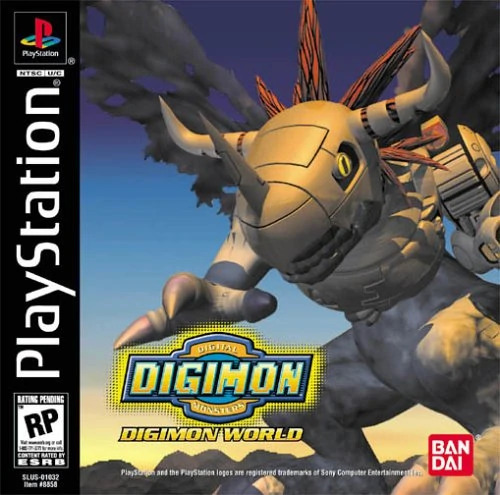
1. Care Mistakes
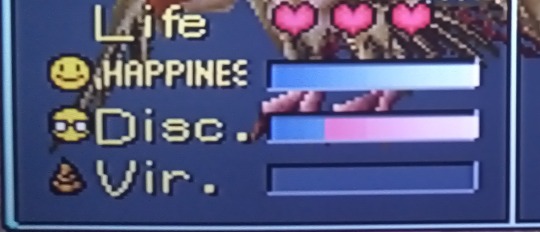
The three emojis - Smile, Cool, and Poop.
Okay. This one - my least favorite part in the game - is going to take a bit of explanation.
First off, I don’t actually hate care mistakes existing as a mechanic. I think it’s a cute, virtual pet-y way to add a different wrinkle to evolution requirements, even if I think it’s a bit counter-intuitive to have to suddenly abuse my little companion once they reach Champion just because I want them to evolve into a floating metallic ball with a chainsaw.
My problem with care mistakes is that there’s literally no way of telling many care mistakes you have on your given Digimon.
Literally everything else in this game is concisely recorded and easily displayed on your Digimon’s stats screen. You can see how much your Digimon weighs. You can see their Happiness, their Discipline. How much Life they have left. Their Age. Even how many poops they need to make before they digivolve into a sentient pile of feces.
But Care Mistakes? Naaaaw, you just gotta remember every single thing that you did to your Digimon from the moment it evolves in your fallible human brain. What’s that? A good portion of this game involves grinding in the Green Gym and it’s really easy to make a Care Mistake there without knowing you did so because you mashed A too fast like the stat-grinding numskull that you are? Well, that’s just too fucking bad for you, then! Enjoy not getting some of the best evolutions, you piece of shit. You stooge. You moron!
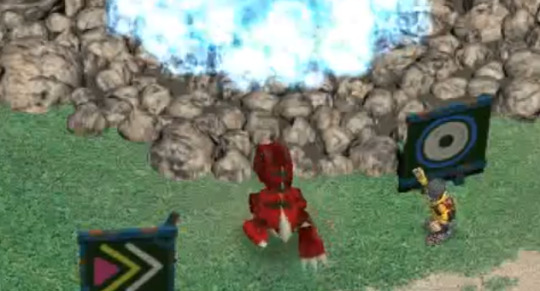
This game, multiple times: You know who I hate? The player.
Care Mistakes are such an invisible mechanic that, to this day, there are many guides with misleading info about what counts as a Care Mistake and what doesn’t, which...really stinks for a game such as this where you will be using a guide pretty extensively to get the Digimon you deserve. And you know why that is? Because we don’t get any indication as to whether or not some random event counts against you when raising your Digimon.
And honestly, having one of your main mechanics of the game being entirely invisible to the player is a terrible idea. Just put a little number in my profile that says “Care Mistakes: 0″ in there. Let me know this information without guessing.
2. The Glitches
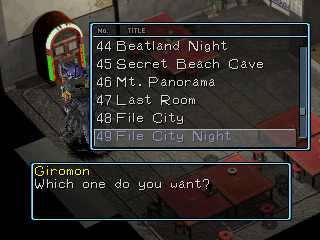
Pictured: Something that will CRASH YOUR GAME if you try it on a physical copy.
Let me start with a disclaimer that most of the glitches I’m going to complain about were added into the game when Digimon World was localized and therefore aren’t the original intent of the developers. There are certain versions of Digimon World that are more stable than others (The English PAL version is the best version to play because of this) and, if you play this game via “certain methods”, there are patches to circumvent some of the bigger problems.
That being said! Boy! Isn’t it ironic that a game where I’m exploring the digital world is plagued with so many annoying, game-ruining glitches? Especially if I’m playing this game on a physical 20-year old copy like a dunce?

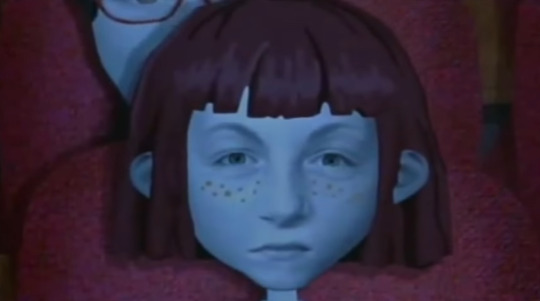
“Ohhhh...so Agumon thinks that they can block the Digimon game with their big fat Digimon-blocking head, do they?!”
The NTSC version of this game has a jukebox that will crash the game if you try to use it, keeping you from ever using a bonus feature meant to be a fun little reward for completing a certain dungeon, but that’s not as heinous as the Spanish, French, German, and Italian PAL versions of this game locking a good portion of the game to players because they forgot to make the Agumon in front of Ogremon’s Fortress an object you can interact with.
So that means, if you happened to get this game in one of four lucky countries, you can’t complete the Ogremon mission, you can’t recruit Whamon, you can’t recruit Shellmon, you can’t recruit anything tied to Shellmon’s bulletin board (which means no Vademon or Skullgreymon), and you can’t go to Factorial Town and recruit Giromon, Andromon, or Numemon. Ogremon is a key part of the Digimon World storyline and causes so many different things in the game to change, meaning that it should’ve been imperative to make sure this part of the game works!
But no. Instead this one little bastard Agumon keeps most players from finishing the game, because it starves players of those PAL regions of a bunch of Prosperity points, the main source of progression in this game. That means that Mt. Infinity and the final boss is just that much harder to unlock. It’s doable, but it’s more grueling process.
This really is a problem with the translators and really highlights a lack of general care with testing this game. Why this game was allowed to be shipped with such glaring bugs is anyone’s guess, especially in an era where you couldn’t release any patches over the Internet to fix retail versions.
3. The Monochromon’s Shop Minigame
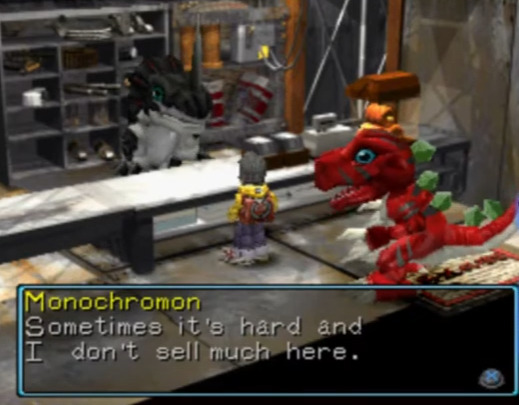
Ohhhh....this one was so close to getting the top spot. When I first wrote this draft, this was the top spot.
Monochromon was only spared of my true ire on account of the fact that it really only exists for one part of the game (rather than being a constant problem like the Care Mistakes and the Glitches are) and you can easily cheese it by sleeping in front of the store so that you can save scum your way to victory. Like a true Digital Champion!
At one point in the game, you gotta help a entrepreneur dinosaur rhino man make a profit, because he was stupid and put his convenience store in the middle of a giant canyon next to a gaping chasm. So you play a little game of haggling, where you try to ruthlessly oversell a bunch of random items to customers until you make enough of a profit that this talking dinosaur tells you that you passed his secret test of character, abandons his store, and moves into File City.
There’s just one problem with this minigame - everything is decided by RNG.
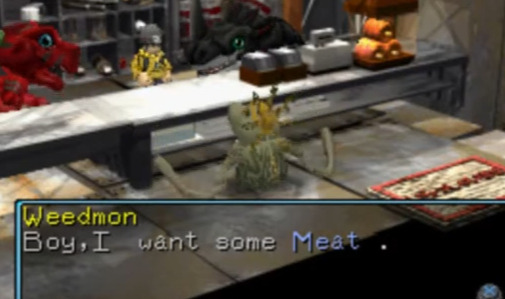
“Get the hell out of my shop”
This minigame hates you. It wants nothing but to see you fail and to waste your time. The difference in profit margins of the three items (Meat sells for 50g, Portable Potties sell for 300g, and Medicine sells for 1000g) are so stark that, if you get too many customers asking for Meat, you might as well just reset the game and start over because it will be literally impossible to meet the requirement even if you busted the customer’s proverbial balls and squeezed every last bit out of their cutesy penguin faces.
Oh! It’s also RNG as to whether or not your customers will take your asking price or storm out of the store without buying anything!
It’s all the fun of working at retail! In a video game!
4. Three on One Battles
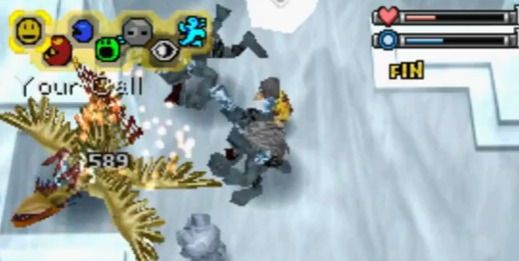
What you see before you is a battle system that is really fun when it’s one vs. one, manageable at two vs. one, and downright unbearable at three vs. one.
The battle system works for the most part. You don’t have full control of your Digimon (and yes, you only have one Digimon with you at one time, so you can never stack the numbers in your favor) so you shout commands at it, commands that the Digimon’s AI are pretty good at following, and hope for the best as you chuck healing items at it.
It’s not the best battle system, but it’s fun. And it definitely reinforces the whole “this is a pet you’re taking care of with its own thoughts and feelings” atmosphere that this game is going for.
However, nothing can protect your Digimon from enemy fire concentrated on them, especially if you did the thing that most players do and equipped your Digimon with the most powerful attacks that also happen to have slower cast times than the faster, weaker attacks.
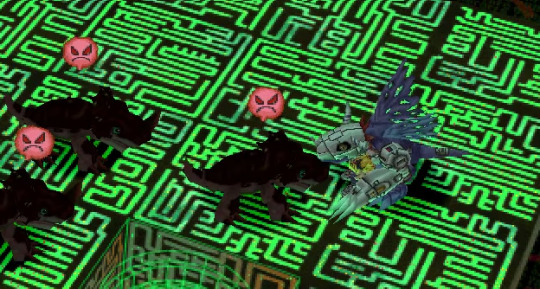
What then happens is your Digimon’s Health is slowly whittled away as you are powerless to stop it, watching as your digital friend is straight up bullied by enemy Digimon as they keep falling to the ground over and over and over and over again.
The one saving grace is that Friendly Fire exists in this game so that oftentimes the enemy Digimon will damage each other in their mad dash to ruin your day, but that seems more like a band-aid than an actual fix to this system.
5. Fishing Seadramon
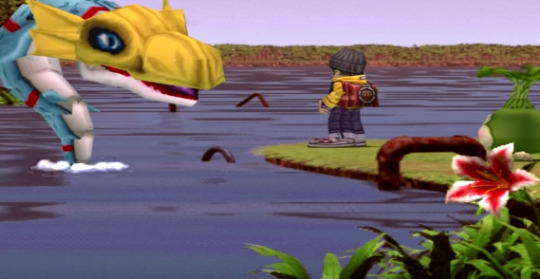
“Hi, kid. Let me guess - you also thought you had to talk to the Tankmon in Factorial Town in order to unlock me, huh.”
This one is a lot less of a pain than the other four and it’s only a little annoying but boy...getting Seadramon kinda sucks in this game.
It took me almost a goddamn hour to catch Seadramon. One hour of gameplay devoted to catching one fish. Just like real fishing!
I will say, besides Seadramon, the fishing minigame in this game is pretty competent. It’s just that Seadramon is very elusive, showing up at only two hours in a 24 hour day, and is a very finicky fish that won’t take your bait even if you literally placed it in front of his dumb fish face.
Don’t be fooled by this screenshot. The heart just means you have the right bait. The heart means that you didn’t actually get within range of hooking him.
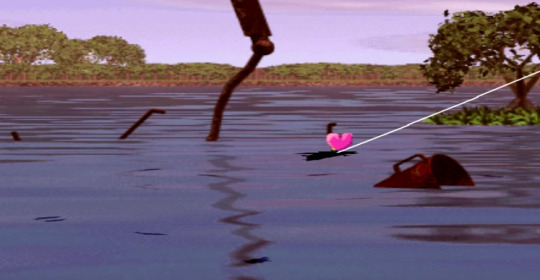
IT’S RIGHT IN FRONT OF YOU!!!
Seadramon is also subject to almost as many gaming myths as the Care Mistakes are, due to how elusive he is, but that’s less to do with poor communication (the game does at least explain multiple times in multiple places how to find him) and more to do with the fact that catching him is just such a goddamn chore to do that players of this game always assume they’re doing something wrong.
When in reality, Seadramon is just a picky little bitch.
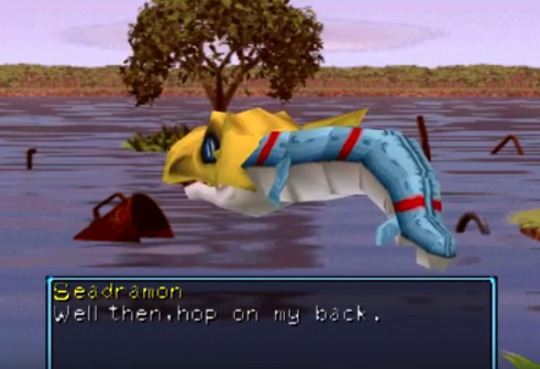
Next time I discuss Digimon World, I’ll talk about things I liked, don’t worry. I just had to get all of this negativity out before discussing the full game proper.
14 notes
·
View notes
Text
in the blood: connecting the backstories
With the arc concluded and what I imagine is pt 1, the pre-AFO bits, of Tomura’s backstory revealed, I thought I’d finally sum up one of the major points of this plot. Scattered throughout the arc were three major backstories—Himiko, Twice, Tomura—that could use some piecing together. It doesn’t seem like they were chosen at random or were primarily subordinated to good timing, and instead were written because they parallel and reinforce certain themes in Tenko’s past.
Here’s my typical disclaimer that these connections may not have been intentional at all, but, y’know. We’ll pretend Horikoshi is a competent writer and etc. etc. Of course, there’s also the question of what conclusion all these narrative threads points us towards, and I’m chronically afraid of making a wrong prediction so I won’t do that on this post lols (it’s also not 100% clear, which I’ll address). Nevertheless, I think it adds significance to consider Tomura’s past with the addition of framing it through the other two backstories, considering what they say about Quirks, society, and the characters’ internal processes about where they fit in the overall scheme of things.
(note: some screenshots below the cut contain mild gore!)
I. Quirk repression
We encounter this for the first time in the MLA arc through Himiko. Although we’re not privy to Himiko’s thoughts during the flashback, Curious makes an assertion that Redestro later repeats: that Quirks can, to some degree, influence a person’s disposition. Transform elicited in Himiko a desire to drink blood (in order to develop a bond of closeness), which was largely viewed as deviant, and she was pressured to suppress not only her impulse, but her Quirk as well. This idea of Quirk=disposition is also repeated with Tomura, who Redestro asserts is only capable of destruction.

Without being told Himiko’s perspective in the flashbacks, we don’t know how her experience with suppressing her desires went, nor whether she experienced any adverse physical effects from doing so. Tomura, however, is clearly stated (by AFO, so it’s worth taking with a grain of salt) to experience unbearable itchiness whenever he represses his urge to destroy, a sensation which only seems to abate when he uses Decay. So for the moment, the message seems quite clear: suppressing one’s Quirk is akin to suppressing one’s self, and even more drastically, there may be physical consequences to doing so.

On the flip side of Quirk repression, then, there’s Quirk liberation. That’s what the Metahuman Liberation Army is going for, of course, but the three characters discussed here also found relief through their Quirks: Himiko in finally shattering her mask, Twice creating his crime gang, and Tenko eliminating that which he hated. Embracing their Quirks is portrayed as a way in which they achieved not only emotional pleasure and fulfillment, but agency as well—an increase in control over their own lives and fates—finally allowing themselves to do what they were “meant” to. This is, supposedly, a move which empowers oneself.
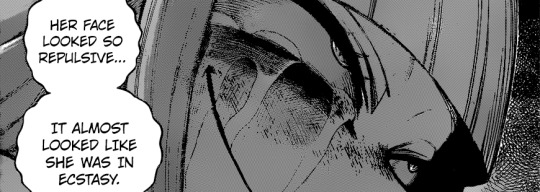


II. Quirk trauma
But that’s not entirely true.
Just as Quirks can be liberating, they're shown to be harmful when used without restraint, turning against their wielder and instilling suffering. Twice’s clones eventually went out of control and began to fight each other for claim to the original, and Tenko’s Quirk awakening killed his entire family. Both experienced trauma involving the people closest to them, Twice being confronted with “his own” betrayal, while Tenko witnessed the deaths of his family at his own hands—in the aftermath, they’re both left completely and utterly alone, abandoned by those they believed they could rely on, with uncertain recollection about how events actually transpired.
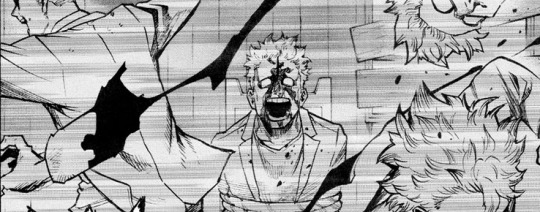
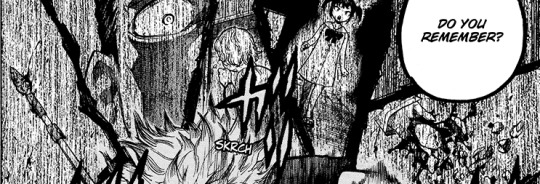
Then it’s no coincidence either that Twice’s and Tomura’s chapters focus on arriving at the truth of their traumas. Twice, after having spent an indeterminate length of time trapped in the uncertainty of his own realness, is forced into confronting his fear of disappearing after Skeptic orders his arms broken; in surviving this, he’s able to confirm that he’s the original Twice, once and for all. Tomura is likewise pushed into recalling his repressed memories (let’s assume right now that they’re the real memories) as his last connections to his family—their hands—are destroyed one by one.

It’s through the discovery of this truth after being confronted with their greatest fears or insecurities that they’re able to embrace the full strength of their Quirks, returning to a default, ‘pre-trauma’ state. Twice is able to create doubles of himself once more, and Tomura becomes able to unleash a stronger version of Decay. While Himiko’s case is much less drastic, the new characteristic of Transform also seems to be linked to her reaffirmation of her ‘truth’ as well. Those ‘truths’ may sound positive or negative, motivated most obviously by self-preservation in Himiko’s case, self-actualization(?) in Tomura’s case, or protective instinct in Twice’s.

Personally, I place a lot of (if not most) importance on Twice’s motivation in this arc, because his past and desires most strongly encapsulate the themes we see repeated across all of these backstories:
III. Alienation and belonging
Perhaps the strongest thread that pervades these three stories (and Spinner’s too, which we have less to go on at the moment) is the feeling of alienation. The four of them found themselves constantly rejected by those around them: Spinner due to prejudice, Twice never getting support nor sympathy after being orphaned, and Himiko and Tenko in particular being denied by their own families, both of them compelled to stifle their own desires, whether it be to pursue her instincts or to voice his dreams. They were positioned as outsiders, set apart from everyone else.



That’s why I believe it’s significant that one of the primary purposes of this arc seems to be to bring the LOV more closely together, from Spinner’s questioning and renewed loyalty, to a central conflict of this arc plot being a rescue (among other schemes from the MLA, of course), to giving the LOV a way out of the aimlessness from the beginning of the arc. Of course, past alienation and present cohesiveness also contrast each other as narrative foils, and this is most clearly exemplified in Twice’s chapters because he’s babey, which more extensively linger on his feelings towards his current situation and friends, who he sees as a remedy to the loneliness of his past.
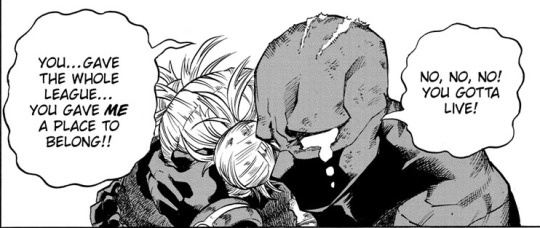
The other characters haven’t offered the same reflection towards the LOV, but it’s not a stretch to say that the group provides them with something that wider society could not. People who accept Himiko’s “normal,” who enable her to pursue her love (for good or ill); who take Spinner seriously despite being a mutant with a “useless” Quirk; and to some degree, even Tomura seems to have achieved what he once wanted. Tenko was a child who made friends with lonely kids, who wanted to be a hero, presumably to save others, but was rejected by his family at every turn and had no one save him at a time when he needed it most. And even though his life as Shimura Tenko is long gone, Tomura currently finds himself as the leader of a group of outcasts who are looking out for him, fighting through a small army to save one of their own. The irony is poetic.

IV. Tragedy or Agency?
Which begs the question: what do we do with this information and how do we interpret these characters? Are they just cruel and unrepentant villains, or should we sympathize with them as people rejected by a prejudiced society? Really, this arc offers room for both readings.
At one end, we have Himiko and Tomura, who view their decisions to become ‘villains’ as liberatory. Whether or not certain painful events in their lives affected their choices seems to matter very little to them, or perhaps those events were even a blessing for leading to the choices they made. They decided to embrace their natures even if those traits were violent, distrusted, and societally shunned, and they do not consider this eventuality as particularly unfortunate. Himiko rejects Curious’ interpretation of her life as pitiable, and Tomura likewise asserts to himself that he’s untroubled by the deaths of his family. They both represent their pasts as not a tragedy.


On the other hand, we have Twice, whose backstory chapter bears the maxim that also appears on the cover page of vol 24, and thus has the privilege of setting the tone for a major portion of this arc: “All it takes is one bad day.” Twice’s backstory (ironically enough) reads uniquely more self-aware than the others’, both about his own decisions, and about the conditions surrounding him (i.e. how other people’s decisions affected him). He was aware of the way others viewed him and how that caused his alienation—best exemplified by how disposable he was at his workplace—and of his reasons for pursuing a “solution” that only dug a deeper hole.

Thus, we have the “one bad day” part of the narrative. Twice, who was orphaned early on and isolated from his peers, got into a motorcycle accident with one of his firm’s clients. His boss hits him and fires him, leaving Twice aimless until he comes up with the idea to Double himself. Twice’s backstory interprets "one bad day” as a truism about instability, particularly in a society which appears to have few safety nets and a lot of prejudice—essentially, the chapter posits that one incident of bad luck can put someone on a worse path, especially when people act in their own interest instead of in sympathy or aid. Okay. See where this is going?

We’re presented with two narratives here: that ‘bad paths’ are either predetermined by an individual’s disposition and are liberating to embrace, or they are often the result of an individual’s circumstances and influenced by other people. Nature versus nurture. The arc does not definitively come down on either side, so I’ll stick to observations and limit on drawing conclusions.

Tenko’s backstory also fixates on a day. The turning point in his life was the day his parents’ rejection of his aspirations culminated in physical violence from his father, setting off the chain of events that led to Decay’s awakening and killing his family; in the aftermath, he was also further alienated in a busy city where no one stopped to help him until he was conveniently ‘found’ by AFO. The “one bad day” lies in the fact that Tenko was entirely salvageable; neither his hatred nor his fractured relationship with his family were conclusive in a five year old’s state of mind, and they both could have been remedied if they had the chance.

So that leaves us with two different takeaways. Can Tenko be thought of as having taken a turn for a better, more self-actualized existence—a not-tragedy—or was it indeed a set of circumstances that should rightfully be considered unfortunate because it was fixable? The resolution of this arc seems to come down pretty firmly on the side of the first interpretation: by embracing his destructive ‘nature,’ Tomura has awakened the full scope of Decay’s power, subdued the Meta Liberation Army, and gained their resources—he’s more influential than ever before, and he’s put himself at an advantageous position to take down hero society. So, clearly his internal monologue must be self-aware, because the narrative is rewarding him for embracing his purpose.
V. The League of Villains and Self-Destruction
But I do have a caveat to add, and it has to do with self-destruction. I’ve talked about Tomura and self-destruction, but that’s not really just a tendency limited to him. It proliferates in most (if not all?) of the LOV members, in more or less obvious ways. Spinner’s crisis of self-worth and subsequent seclusion was arguably self-destructive, as is Mr. Compress’ tendencies to run away from conflict. These are more metaphorical and without much elaboration yet. On the other hand, for a more literal take, there is Dabi, who burns himself alive whenever he uses his Quirk.
Himiko’s is somewhat a mix of both figurative and literal. Transform lets her take on someone else’s appearance, and she has an obsession with ‘becoming’ her objects of affection; it follows that if taken to the extreme and if she’s successful in 'becoming,’ she erases her own identity in the process. It’s no different than the ‘mask’ she assumed until middle school; she trades one mask for another, more appealing one, and her own ‘self’ is what gets destroyed.
Then there’s Twice. Double first started off as something that gave him comfort when he found himself utterly alone, but from there only lead to even more mistakes. Using his doubles to commit crimes as an ‘easy out,’ every decision Twice made thereafter piled on to conclude in his doubles’ murderfest. What began as comfort became the conduit for his own, literal, self-destruction as his doubles turned on each other.
Similarly, by the end of 239, Tomura has fully unleashed Decay. Like the first time he used it, he found it liberating, a release for all the emotions he experienced and repressed. Much like the rest who embraced their Quirks, it was a source of pleasure and comfort, but not without consequences: as shown by the damage one to his right arm, his body can’t sustain that kind of use. Decay too much, and there will be blowback in the form of starting to injure himself. It is, again, a form of literal self-destruction.
VI. To conclude:
The arc ends on a firm note about Tomura’s growth, and the direction thereof, concluding that Quirks affect innate drives which our antagonists have accepted and been rewarded for; however it follows on the heels of contradicting points about how that very acceptance and overindulgence ends in self-destruction. Our antagonists have been strongly linked together via backstory, highlighting the similar sources of conflict they’ve experienced. Familial strife, instinctive drives, the price of overindulgence, and the indifference of society are all elements that deeply influenced these characters, and their stories are continuations of how they conceptualize these elements with respect to their own senses of self. Again, assuming that we’re dealing with a competent writer, we can assume that these themes will be revisited as the story continues; namely, addressing to what degree a Quirk determines a person’s future (ideally, there should be a convergence of the messages brought up in this arc with those brought up with Shinsou and Monoma), coming to a resolution about the disputes of personal versus societal responsibility, and deciding how the narrative itself feels and wishes to convey about our antagonists and their struggles.
#shigaraki tomura#bubaigawara jin#toga himiko#shimura tenko#tomura shigaraki#jin bubaigawara#himiko toga#bnha meta#for those who want to know what to expect#2.4k words and 6 parts lulz...
112 notes
·
View notes
Text
My Decade in Books
I was tagged by the lovely @brightbeautifulthings and her blog is filled with exactly that, so please jump over and give her a follow.
The 2010's were good years - they weren't perfect by any means and they involved a lot of growing up/learning what it means to be an adult, but I think that I came out of them a much better person and better prepared for what the world has in store for me. Looking back, I read a lot of amazing books! When I went back to make my choices for this post I was surprised to find that I read 333 books from 2012 through 2019! 2012 was the year that I created my Goodreads account and since then I have used it to track my reading progress over the years, so looking back at 2010 and 2011 may be a bit hazy, but there are a couple of special reading moments near and dear to my heart that I can share. So let's get into this~
The Rules: Respond to the prompt “My Decade in Books” however you want and then tag some people! I decided to share a book and/or series which defined the year along with some of my memories/reasons as to for doing so. You can do that or make up a response that is entirely your own, there is no wrong way to go about it.
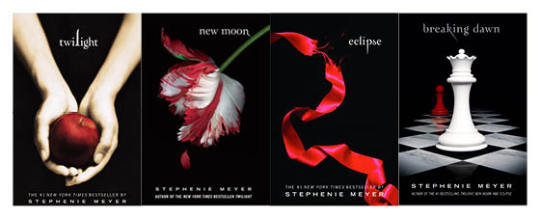
2010: Yep, like many I got caught up in the Twilight craze and while I still find sparkly vampires a bit odd/silly, this series did motivate me to start reading again on a regular basis. Prior to that, I had been in a car accident in the late fall/early winter of 2006 and then my daughter was born April 2007. Unfortunately, my mental health was not the greatest as I was dealing with post-partum depression in combination with my pre-existing depression and possible/slight post-concussive changes. In 2010 I was given a boxed set of the series as a birthday gift and reading it ultimately helped spark my interest in books again - this was one of the first steps to breaking out of my apathetic depression. I will always be thankful for Twilight because it showed me that I was still capable of feeling real living breathing changing emotions.

2011: This year was marked by the completion of my Associate's Degree in Accounting/Business Administration that spring and acceptance to continue studying accounting at the local state university. My daughter was 4 years old and about to start preschool. We were able to get a place of our own moving in with my wife (then girlfriend) into a cute 2-bedroom apartment - we became a family. One of the best memories I have from our time living there was how at night I would read the story of the boy wizard who lived in a closet under the stairs to our daughter. This series would go on to define so much of our lives as it became her favorite for a number of years - the first major book series she read entirely on her own, eventually going on to do so in Spanish as well. We became a small flock of Ravenclaws and she has bloomed into quite the reader herself. I will always have a soft spot in my heart and memory for this series because of the story it tells and for the part it played in our story.

2012: I previously read King's Dark Tower in the mid 2000's and the story deeply resonated with me. When I found out that King was planning to release a new Dark Tower book, The Wind Through the Keyhole, I knew that I had to reread the series. The series' story feels dark and gritty, the tale of a knight from a world that has moved on fulfilling his quest to reach the Tower, revered as the center of all worlds. There is a certain tragic nostalgic romance to the story of an old knight in a dying world haunted by his past questing with what initially seems to be an unlikely group, only to eventually come together as something more - as ka-tet. This is a series that I know I will return to in the future.
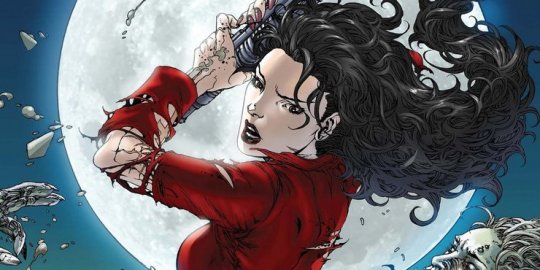
2013: If you go through my Tumblr history, specifically on my book blog, you will come across my reviews and a large portion of my reviews written in 2013 dealt with my read through of Laurell K. Hamilton's Anita Blake, Vampire Hunter series - 22 books and 1 novella (Guilty Pleasures through Affliction). I first picked up Guilty Pleasures during a book sale in ~2011 and I recall reading it and a couple of the subsequent books (maybe 3 of them at most). At first, I was drawn in by Anita herself but when I came back to the books in 2013 and read the entire series I found myself intrigued by the many characters around Anita and her relationships with them. The series started as one thing and developed into something different - changing focus from a supernatural police procedural to being more character driven. This doesn't mean that Anita doesn't still go out and hunt the bad guys, but it is no longer the absolute main focus of the story and I am okay with that. Anita and her relationship struggles helped me to understand/come to terms with the concept that love isn't the same across all relationships, that people love differently and that is okay. It helped me to become comfortable in the knowledge that I can love others and it doesn't compromise/lessen the love that I have for my wife. For that reason alone, I will always have a strong admiration/fondness for Anita Blake. I plan on reading the two most recent releases (Crimson Death and Serpentine) some time this year!~
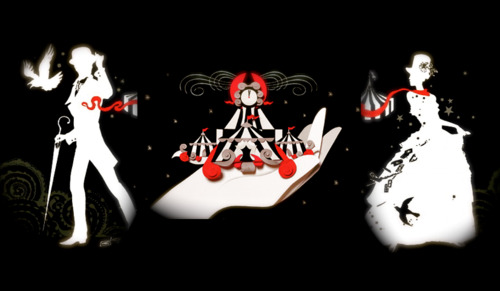
2014: This year was a very very difficult year for me and my wife and I spiraled into a deep depression. Due to my mental health difficulties I failed to complete my bachelor's degree program and had to leave school. I ultimately wound up doing nothing more than sleeping, playing video games, and attempting to read when I could. I remember that I was scrolling through Tumblr and I saw a post praising The Night Circus by Erin Morgenstern - I was immediately enamoured with the cover, the starkness of the black/white/red, a circus, magic, and intrigue, I had to read it. My first read through took me 4 days because I never wanted it to end. This book helped me break a major reading slump through its beautiful lyrical prose of opponents turned lovers forged and bound within the fire locked behind the blackened gates of the traveling Les Cirques des Reves. I have read this book a total of 4 times and each time has only further deepened my love and appreciation for it - this book is my ultimate comfort read (though it may now have strong competition from her sophomore novel, The Starless Sea).

2015: At the behest of my love and my pseudo brother (I basically adopted him as the younger brother I never had) I picked up/started reading Robert Jordan's epic fantasy saga Wheel of Time which was ultimately completed by Brandon Sanderson following the death of Jordan. The series made up a great deal of my 2015 reading though I did make time for other books as well. What I particularly loved about the series was a combination of the richness of the world and the complexity of the characters. We witness these characters as they mature and grow into themselves ultimately becoming worthy of the title of ta'veren placed upon them by the Wheel. With the Amazon TV show on the horizon, I will likely pick up the series again and with subsequent readthroughs comes the opportunity to pick up on little things/foreshadowing that may have been missed before.

2016: This was another year where I didn't read a lot of books (only 38), but the majority of the ones I read were ones that I really enjoyed and Gail Carriger's Parasol Protectorate Series was a notable favorite. While I was working on my bachelor's degree I had the opportunity to take an upper division English course focused on Victorian Era literature and what started as a spark of interest became a warm comforting fire. Parasol Protectorate combined two genres which I had enjoyed on their own (historical fiction and paranormal/fantasy[?]) into something which felt entirely unique. I fell in love with the characters and thoroughly enjoyed the series - so much so that I have returned to Carriger's Victorian Era with my current read through of her Finishing School Series, an upcoming re-read of Parasol Protectorate, and a first time read through of the sequel series The Custard Protocol.
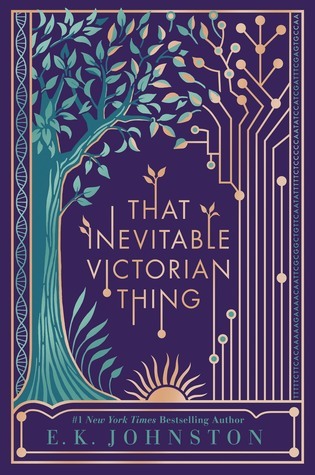
2017: So much of 2017 is honestly a blur... I was hired in July 2015 as a medical transcriptionist but over the following years would continue to gain increased responsibilities (with associated pay increases) allowing for some pretty notable things to occur leading up to my girlfriend and I getting married!~ We had been dating/living together in addition to having been friends for so much time before that it just made sense for us to get married and I can't picture my life without her in it. My favorite read that year was E.K. Johnston's That Inevitable Victorian Thing for so many reasons. The novel plays with history as we know it and speculates on what would have occurred had colonialism never taken root and instead a utopia was formed under the British Empire - an empire without racism, homophobia, and classism built upon mutual respect and harmony. This book is full of diversity/representation/LGBTQIA+/etc. while exploring identity, orientation, and relationships in a respectful/open-minded manner. I have already slated this book for a re-read as soon as I finish my current read through of Carriger's works.
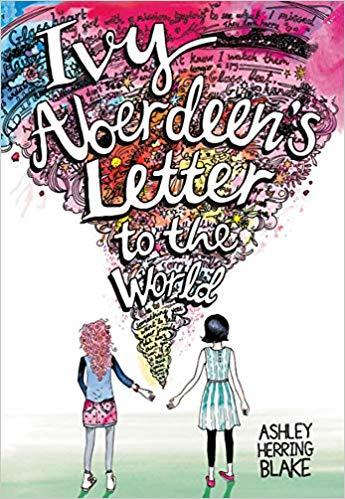
2018: This book is probably one of the most important books I have ever read. I can't remember how exactly I came across it but I knew that I had to read it as soon as I read the synopsis. I then shared it with my daughter (who was then 11 years old) and we decided to buddy read it. This book...this is the book that I wish I had had the opportunity to read when I was that same age attempting to learn about and understand my own sexuality. This book has also allowed my wife and me to have a continuing, open dialogue with our daughter (now turning 13 in April). I actually Tweeted this basic sentiment to Ms. Blake upon finishing the book and she actually replied to me!~
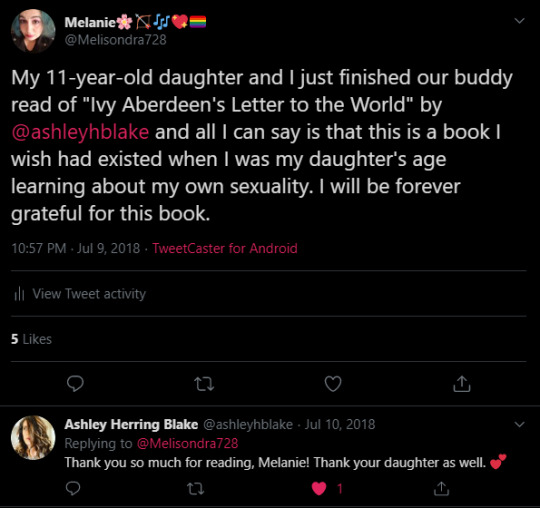
Since then my daughter has read the book multiple times and we bought her a hardback copy for Christmas. Maybe one day we can attend a signing and thank Ms. Blake for Ivy's story personally.

2019: My favorite of read of 2019 was Elizabeth Wein's Code Name Verity. ((I know, I could have easily posted and gushed about Erin Morgenstern's The Starless Sea which I absolutely love but given that I had previously mentioned The Night Circus I felt it prudent to discuss something else.)) When I was book blogging in 2013-2014 I remember seeing a lot of posts talking about it and its unique approach to storytelling. I remember picking up the ebook but I was so caught up in reading other things at the time that it sat on my TBR shelf. Fast forward to last year and I finally decided to take the time and read it. Color me 100% floored and angry at myself for waiting so long to read it! I fell absolutely in love with Verity/Julie, with the story that she wove, with the friendship between her and Maddie. The synopsis describes the book as "harrowing" and "beautifully written," descriptors that I wholeheartedly agree with. My wife knew how much I enjoyed it and I received a copy of the hardback edition which will eventually grace my bookshelf (sort of kind of need to buy one first).
So that is My Decade in Books! I am very bad about tagging people in things, but if you saw the post and feel so inclined to make one of your own please do and tag me in it to check out. If you stuck through this post to the end, I greatly appreciate it and wish you well in the new reading decade.
*Zyn/Melanie*
8 notes
·
View notes
Text
The 100: 6x09 What You Take With You
How amazing was this episode? It is, so far, one of the two best episodes of the season (alongside 6x07) and probably in my top 10 favorite The 100 episodes of all time.
It benefited from its focus on just three storylines and a limited number of characters, which allowed it to properly focus on the characters and their psychological and emotional journeys.
The title seems to be a reference to the Dagobah cave scene in The Empire Strikes Back, or rather, the dialogue right before it:
Luke: There is something not right here. I feel cold, death.
Yoda: That place… is strong with the dark side of the Force. A domain of evil it is. In you must go.
Luke: What’s in there?
Yoda: Only what you take with you.
Luke ends up having a hallucination of fighting Darth Vader in the cave and killing him, only to take off his helmet and see his own face, in possibly the most famous movie scene of a character confronting their “Shadow” self.
So, when the episode titles for season 6 of The 100 were released, it wasn’t hard to guess that this episode would contain scenes of a character “facing their demons” in a fantasy sequence (and which character it would be, especially as we had seen glimpses of Octavia fighting the Blodreina version of herself in the trailer). As a fan of psychological character exploration through trippy fantasy sequences, I had high expectations from this episode regarding Octavia’s story – and they were completely fulfilled and maybe exceeded. I wasn’t expecting to see Charles Pike in Octavia’s hallucination soul-searching, and his appearance and how he was used was brilliant.
The other two, equally important storylines, were:
the continuation of the saga about the Bellamy/Clarke relationship through the story about the fight between Josephine and Clarke for control of Clarke’s body, and Bellamy’s attempts to save Clarke from real and certain death;
and the conclusion of the opposite storyline - about Abby crossing a lot of ethical lines to work with the Primes and use bodysnatching to resurrect Kane in another body. This was the final death of Marcus Kane, a tragic end of Kabby romance, but it also a fitting ending for Kane, with him asserting his own integrity and morality by choosing to die and refuse to be complicit in the practices of the Primes, but to instead start a fight against them. It will also probably be the turning point in Abby’s character arc. The resolution of this storyline has caused a lot of controversy and anger, which I don’t understand, since Kane’s decision was obvious and in-character, so much that I predicted it last week, because it was the only thing that made sense narratively and for Kane’s characterization.
More thoughts under the cut.
Octavia vs Blodreina
The fact we still don’t know what happened to Diyoza or to Octavia in the Anomaly makes me think that this is a plot that will carry over to season 7, after the bodysnatching business is wrapped up. And the more they postpone the resolution, the more hopeful I am for Diyoza to survive season 6.
Choosing the angry, violent red box instead of the calm green box is such an Octavia thing to do. But maybe it was the right thing in this case, as it let her face her demons head on and figure things out for herself.
The red butterflies scene was one of the many callbacks to season 1.
Pike’s role made sense because Octavia’s descent into darkness was not just prompted by the trauma of Lincoln’s death at Pike’s hands, but also because it started when she decided to murder Pike for revenge, making herself judge, jury and executioner. That was the first time she committed actual murder, as opposed to killing people in fight. She probably thought at the time, as a big portion of the fandom did, that Pike was a bad guy and had it coming. But one could now say the same thing about Octavia herself, and she is obviously aware of it. If Pike deserved to die, doesn’t she, too? Using the same standards, shouldn’t she be murdered for revenge by someone like James (the Wonkru guy from 6x02, who lost his mother in the gorge and blames Octavia fori t)? In fact, Octavia tried to get him to kill her, because, on some level, she thought she deserved death, too, even while she was pretending that she didn’t feel any guilt and trying to justify all her actions. Why should Bellamy ever forgive her for throwing him into the fighting pit to die? I can see many similarities between Octavia and Pike: both of them are fighters by nature, both were driven by the desire to save and protect people, both were angry and traumatized by what had been done to their people, and both were also prone to black-and-white thinking and harsh judgment of their enemies. As Octavia’s mind version of Pike pointed out, we are products of what we have done, and what has been done to us. Pike is an embodiment of both for Octavia. And Pike himself was a product of what the Ice Nation under Queen Nia had done to him – killing almost all of the people he grew up with, many right in front of him (including 15 children), which made him go into the woods to fight for months. Pike started pre-emptively seeing Grounders as enemies even when they were not, and eventually, as a Chancellor, started acting as a dictator and hunting for traitors in his camp. Octavia started by proclaiming everyone (or almost everyone – Echo didn’t count) her people, One people, but that eventually turned into tyranny and seeing enemies in everyone who disagreed or refused to do everything she asked of them. Pike condemned Lincoln to death and execute him for the same reasons Octavia as Blodreina condemned Bellamy, Indra and Gaia to the fighting pit: to maintain authority and show that rebellion is not allowed and will be punished by death. We may not have seen this put into words, but Octavia’s vision of Blodreina in Pike’s role, condemning/executing Pike the way he had Lincoln, showed her realization about herself. „Pike“ even reminded Octavia that he was trying to earn his redemption by doing good when she killed him. Of course, since Pike was really an enbodiment of a part of Octavia’s own mind, it is really something she has been thinking about and that she’s telling herself. It’s a level of self-reflection that I never expected to see from Octavia of the earlier seasons, and shows how much she’s grown.
So does she deserve redemption? As „Pike“ pointed out, it is not about deserving. You just need to make the decision to go and do good, and not be Blodreina anymore, shown by her symbolic killing of „Blodreina“. She is still to actually start her redemption arc, but getting into the right frame of mind and realizing she wants to change and do better was the necessary first step.
Kane’s goodbye
I’ve already written quite a bit about Abby’s emotional and ethical downfall and the tragic development of the Kabby relationship in seasons 5-6 here and I predicted that the storyline would end with Kane’s death by his own choice (and that Henry Ian Cusick would return to play Kane in a vision for his last scene), even though I didn’t guess when or how it would happen.
Unlike some other fans, I find this to be a very fitting ending for Marcus Kane. I don’t think of what he did as suicide, but as a sacrifice, or, more than anything, a refusal to legitimize and benefit from an evil practice that involves brainwashing people so they could be lambs easily led to slaughter, and then murdering them as lesser and disposable, so you could prolong your own life. He couldn’t fight against it, speak against it, while being in a stolen body himself. (There is a reason why Gabriel is ashamed to admit to his followers that he lives in a host body.) Everything about it was wrong to him, and went against everything he believes in. (Meeting Gavin’s widow and realizing that the Primes are lying to their people also played a role. As Gabriel confirmed in this episode, and as Kane 2.0 and the other Primes, no doubt, are aware, there is no trace of the host mind after the transfer – unless the transfer fails.)
Indra has finally been woken up! But is she staying on the ship now, and if so, when do we see her again? I’m glad she got to say goodbye to her friend before his death. I like the fact that Indra pointed out that both the Arkers and the Grouders had some disturbing practices of their own, but Kane gave the logical answer (something I was hoping someone would point out at any point) – the fact we did bad things in the past, doesn’t mean we should let evil things happen. That’s not how morality (or common sense) works.
The show loves angst, so of course, Kane’s death had to be exactly like Jake Griffin’s death (which we saw in the flashbacks in 1x03), and Abby had to witness it. But, as Raven pointed out, it is better for her if she gets to say goodbye. (Raven would know, since she never got to say goodbye to Finn or Shaw. Or Sinclair.) Kabby has been one of my favorite ships on the show – because it is one of the very few romantic relationships that was well developed, way before Kane and Abby got together. Their chemistry was obvious since season 1. And while Greyston Holt did a great job playing Kane 2.0, it only made sense that Henry Ian Cusick return to play Kane in that last scene, when Kane appeared to Abby the way she saw him in her mind-eye - which also made him feel like real Kane to the audience. The scene was truly beautiful and sad, with Abby’s heartbreak, and Indra and Raven reciting the Ark prayer (with Indra adding the Grounder “Your fight is over”). I don’t think that Kane would really do the same to bring Abby back – or that Abby would have done it if she had been in a healthier state of mind, but I can see why he told Abby that. While he disagreed with her decision and couldn’t accept it, he showed understanding, empathy and love to her, while urging her to let him go and continue her life.
All in all, considering the tricky actor availability situation due to Cusick’s role on another show, I think that the writing staff have found a good way to give Kane a proper sendoff, and make it meaningful and highly relevant to this season’s themes and main plot.
In a way, it’s more Abby’s tragedy than Kane’s – he made the decision that was the only right one, one of the most in-character things he’s ever done, but Abby is still lost and needs to let go off Kane, really recover from addiction, and find her own sense of morality again.
The Kane/Abby storyline and relationship this season is juxtaposed to the Josephine/Gabriel story – and the Clarke/Bellamy story. We have seen bodysnatching as something people (Gabriel, Russell and Simone with Josephine, Abby with Kane) resort to in order to resurrect someone they love. But while Josephine couldn’t be happier about it – because she’s selfish and, let’s say, morally challenged, Kane, with his deep sense of morality, could never accept that. We’ve also seen a storyline about Bellamy doing everything to save Clarke – but while all of those are motivated by love, the big difference between what Bellamy is doing and what Abby has done (and what Gabriel initially did when he resurrected Josephine, at the expense of 40+ of the people he had raised from embryos) is that Bellamy is fighting against an evil act, to right a wrong, as opposed to doing evil or enabling evil.
Bellarkephine
Bellarke has always been the central relationship on the show, but it’s never been as front and center as it is this season. In 6x07, Clarke gave up on living at the moment when Josephine managed to convince her that Bellamy had given up on her and moved on and that he and everyone are better off without her, and the last few been about Bellamy being willing to do everything to get Clarke back. The show is being really obvious about Bellamy’s and Clarke’s feelings for other other, even more so than it was in the previous seasons (and I happen to think it was already quite obvious). It’s not the first time that other characters have called out those two on their feelings for each other (from Lexa noticing in season 2 that Clarke cares for Bellamy and worries about him more than about her other people, to ALIE!Raven in season 3, taunting Bellamy over being more devoted to Clarke than his girlfriend Gina, to Octavia calling out Bellamy in season 5 and calling Clarke another traitor who he loves), but now it is an integral part of the main story, the way it was not before.
I’ll say one thing, though – while it is undeniable, seeing his behavior over the previous few episodes. that Bellamy cares for Clarke more than anyone else at this point, as Josephine points out (and that statement implies that he cares for her more than his girlfriend, Echo), I think one should be fair and acknowledge that Clarke is in danger of certain and definite death, after a definite and short period of time, while the others back in Sanctum are only in danger of potential death, so I don’t think it would be fair if they begrudged Bellamy going off to save Clarke.
This dynamic was weird, because Bellamy was simultaneously not fond of (to put it mildly) of Josephine, but was incredibly tender and caring with her body, because it was Clarke’s body, and Clarke is still in there somewhere. The way he gently wiped JoClarke’s black blood and put his own, so the Children of Gabriel wouldn’t know she was a Nightblood, reminds me of Bellamy cutting himself to fool the Ark guards, so they wouldn’t know the blood belonged to Octavia, when she would accidentally cut herself.
Josephine said that love was the reason why Sanctum would be destroyed – implying not just that her father put everything in danger for his love for her (by putting her in Clarke’s body), but also that Bellamy’s love for Clarke and his determination to save would be the cause of Sanctum’s destruction. It’s the 3rd time that the word “love” has been used on the show to describe Bellamy’s and Clarke’s feelings for each other: the first time was in season 2 when Clarke said she was being weak when she tried to keep Bellamy from going to Mount Weather, because love is weakness; the second time was in season 5, when Octavia called out Bellamy on pleading for the life of a traitor who you love; and this is the third time.
The moment when Bellamy looked at Clarkephine when he knew Clarke could hear him, and paused before saying “I won’t let you die”, was one of those moments where Bellamy or Clarke seem to want to say more, or are saying a lot more, through or instead of a statement like “Hurry” or “Don’t feel bad about leaving me here”. Those two have always had their own way of saying ILY.
Bellamy replying “Tell me about it” when Josephine called the “weird” relationship between him and Clarke “exhausting” has to be one of the best meta moments on the show.
(BTW, I don’t think Bellamy actually wanted to kill Clarke in 1x02 – the first moment he could have let her die, he saved her. But maybe she thought so, or maybe Josephine saw her memories and drew that conclusion. Also, the show Josie is misusing the word “genocide” and should look up the definition.)
But after a while, what was Josephine trying to taunt Bellamy, turned into Josephine being moved by Bellamy’s love for Clarke – not because she’s a compassionate person (she’s not), but because it reminds her of Gabriel’s love she had and lost. We got her explicit confirmation that she has really been in love with him, since they got to the planet (which may have been the first time they met). And while we know, from his reactions in 6x08, that he is still in love with her (but she may not know that), he has still been trying to kill her for the last 70 years – because she is a villain and is largely responsible for maintaining a terrible system of oppression and murder. This is the main difference between Gabriel/Josephine and Bellarke: Clarke is actually not a villain, she is a hero. Josephine is the villain that some of the characters and a part of the fandom imagines Clarke to be, because they are not paying attention to the actual story.
I love the fact that Clarke used the Morse code, for the second time, but now to both mock Josephine with “Boohoo” and try to make Bellamy laugh, while confirming that she was able to hear them both.
It’s really amazing just how Bellarke-heavy this episode was, even though Clarke and Bellamy weren’t able to directly interact most of the time – and haven’t been since 6x04. The one moment when they did get a chance to interact, for some 10 seconds, was when Clarke temporarily took control over her body because Josephine realized she sucked at defending herself and had to let Clarke do it. And it was amazing – the way Eliza changed her expression, voice and demeanor and the way she looked at Bellamy, the way Bellamy immediately knew she was Clarke, the chemistry that was suddenly there again in full force when it was Bellamy and Clarke interacting, rather than Bellamy and Josephine. Clarke is determined to never leave Bellamy again (as we saw in 5x13, when she was not willing to leave him behind even while they were seconds away from missiles hitting), but this time, he was right that literally staying there would have killed her, so she did the smart thing and sneaked him the keys – allowing him to save himself, while he let her go to save herself.
My judgement of the Children of Gabriel after 6x03 still stands: morally ambiguous group, the right goal, but too murder-happy.
Josephine may be a 200+ old narcissistic, evil Prime that I want to die, but her interactions with Clarke are really fun. It was great to see Clarke get the upper hand, at least for a while, and be in control again. And I loved the fact that Clarke rubbed it into Josephine’s face that she had stolen some skills from her – and calling her out on the irony of Josephine complaining about it, while living in Clarke’s stolen body.
I can’t wait to see Josephine and Gabriel reunited, and Octavia and Clarke and Bellamy reunited – but I’m also looking forward to more of the Clarke/Josephine fight for control in the mindspace.
Rating: 10/10
#the 100#the 100 6x09#what you take with you#the 100 season 6#octavia blake#marcus kane#abby griffin#bellamy x clarke#bellamy blake#clarke griffin#bellarke#josephine lightbourne#blodreina#charles pike#gabriel santiago#charmaine diyoza#indra#indra kom trikru#raven reyes#kabby#kane x abby#abby x marcus
42 notes
·
View notes
Text
The Devil is among a group of people trapped in an elevator!!!
The film ‘Devil’ is a smart and scary tale about good, evil, fate, and religion. It also implies that M. Night Shyamalan’s primary ability has always been imaginative narrative rather than actual filmmaking.
If you’ve gone to a movie theater in the last few months, you’ve probably seen people’s reactions to the Devil’ trailer: they sit silently fascinated until the phrase “From the imagination of M. Night Shyamalan” appears on the screen. That’s when the applause and/or boos start.
It should be noted, however, that Shyamalan’s participation with Devil is limited to writing the story for the picture and guiding it as the first chapter in his ongoing trilogy, The Night Chronicles. And believe me when I say that having Shyamalan at a remove makes all the difference in the world. The Devil isn’t the best ghost story ever told, but it’s a lot more fun than you may think.
The concept is typical Shyamalan: on a stormy day in Philadelphia, five individuals visit a high-rise office building downtown (for varied reasons) and happen to board the same elevator. While the building’s employees and several officers try to get the stranded passengers out of the elevator car, the passengers begin to experience bizarre and fatal happenings that pit them against one another.
People look at that simple concept — set in a single location, no less — and the odds of Devil having the creative energy to sustain itself for 80 minutes begin to collapse fast in their thoughts. However, I am here to tell you that this is a common mistake (one I was guilty of myself): Devil plays it smart by making effective use of time, perspective, and, most importantly, plot, which would have been a terrible catastrophe to carry off in a respectable way. In classic Shyamalan fashion, there are certain plot twists tossed in for good measure, some of which you will definitely see coming, while others you may not.
Let’s start with pace. Taking into account the time it takes to set up and put things down, the real screen time spent in the elevator is about 50–60 minutes. The events unfold in real time, which benefits the picture by keeping things tight and urgent, and it helps the actors involved to infuse their performances with high-octane intensity since their characters are naturally caught up in the terrifying moment.
The film is also clever in how it employs the “single-setting” format, which is a deceptive term. The screen time is mostly divided between the elevator and the events taking on outside of the elevator, including the security officers and cops attempting to rescue the trapped people.
In reality, the majority of the film’s plot revolves around what happens outside the elevator, with the elevator itself serving as the necessary trigger. Brian Nelson (30 Days of Night, Hard Candy) is the screenwriter who fleshed out M. Night’s plot, and he smartly keeps the dialogue between the passengers within the box snappy while keeping viewers focused with movement and physical action carried out by the actors on the outside.
This tight control of time and space keeps us engaged (searching for that hint that will unveil the enigma), but also prevents us from being too bogged down or bored. Perspective was also well managed. Director John Erick Dowdle (Quarantine) frequently shifts between the individuals within and outside the box, keeping us aware, intrigued, and on our toes.
Dowdle employs clever camera angles within the elevator, gently moving around from the center of the box, capturing each passenger alone in the frame for a brief period, allowing the actors’ responses to hint at what they’re hiding, or what we should be wary of. The elevator feels like an enclosed and unavoidable death level, which heightens the suspense. Lighting is also used wisely — after all, it’s difficult to determine who a murderer is when the killer exclusively strikes in the dark; sound is also used well in those “dark times.” Bottom line: an elevator murder mystery is a premise that might easily go off the tracks, yet filmmakers manage to keep the train on track all the way to the station.
The actors are mostly “seen them someplace” faces that you might not know by name. The five passengers stuck in the elevator are played by Bokeem Woodbine (Black Dynamite), Logan Marshall-Green (Dark Blue), Jenny O’Hara (Mystic River), Bojana Novakovic (Edge of Darkness), and Geoffrey Arend (500 Days of Summer), and they all work nicely together.
It also helps that each of the five performers is brilliant; just when you think you’ve figured out which one is the one, another actor will give you cause to rethink. They do a fantastic job of maintaining the strong sense of five individuals who are terrified as heck (no pun intended) but not scared out of their wits. You’ll have to see the movie to understand what I mean.
The people working outside the elevator are also recognizable faces with names you might not recognize. Jacob Vargas (Traffic, Death Race) excels as the one religious security guard. Vargas’ job is to provide all of the goofy supernatural/religious exposition necessary by the tale, and the actor smartly handles his character with enough sarcasm to guide us through those silly portions with chuckles rather than moans.
Matt Craven (Public Enemies) portrays the straight guy to Vargas’ comedic character, a second security officer who believes his partner’s religious warnings are nonsense and isn’t afraid to tell him so. Chris Messina (Greenberg, Julie & Julia) plays Detective Bowden, a police officer who is called to the scene and quickly finds himself in the middle of something he never imagined.
I previously stated that the plot is also one part of the Devil that was handled properly, and this is correct. It’s difficult to describe without giving away any spoilers, but I will say this: there is a plot at work here with a distinct arch and goal, and it goes beyond what the original “whodunit” concept indicates.
What Shyamalan has created seems more like his Sixth Sense, Unbreakable, and Signs days than the controversial later part of his work portfolio. Devil reminds me of a period when M. Night was more interested in telling interesting stories that defied genre norms than in novels that functioned as thin veils for his preachy or egotistical lectures.
Working with other talented filmmakers and writers clearly relieves some of the pressure and gives Shyamalan the space and freedom to do what he does best: tell clever and moving stories that chill, thrill, and keep us guessing, and while Devil isn’t the greatest movie ever, it certainly achieves those things.
As you might expect from the title, religion plays a significant role in the plot, presenting the picture as a type of morality tale. It’s a bit surprising that the film wasn’t marketed as a Christian drama a la God’s Not Dead. Fortunately, the film does not portray religion as the best thing since sliced bread, instead of employing faith in a higher force to make the five imprisoned humans effectively atone for their crimes.
As a result, it’s a shame that the characters aren’t as thoroughly developed as they could have been. With the exception of Messina’s Bowden, most of the other characters are fairly poorly drawn, living solely to die or to vomit out a sickening quantity of exposition.
Though its structure and dialogue might have been improved, Devil isn’t Shyamalan’s worst effort. In reality, the multiple stressful sequences, along with superb camera work, make for a surprisingly enjoyable film.
Channel: https://www.youtube.com/channel/UCIUvYQqHaJulahGrU942ONQ
Playlist:
Sexy Love: https://www.youtube.com/channel/UCIUvYQqHaJulahGrU942ONQ
Horror: https://www.youtube.com/playlist?list=PLru4FE1-1keyyqd1rYJnlwpqE8ysUn2uv
0 notes
Text
Episode Reviews - Star Trek: The Next Generation Season 2 (3 of 5)
This post has been slightly delayed by a temporary prioritisation of my novel writing, but we’re now up to the middle round of episodes for Star Trek: The Next Generation’s second season. So, let’s quickly make up for lost time and dive right in on the first episode of the round…
Episode 10: The Dauphin
Plot (as adapted from Wikipedia):
The Enterprise is assigned to transport the beautiful Salia, future ruler of Daled IV, and her governess Anya from a planet to which she has voluntarily exiled herself. Her parents, rulers of two opposing factions on Daled IV, have died, and Salia represents a chance to bring unification to the two factions. As such, Anya is overly protective of her. On board, Salia meets young Acting Ensign Wesley Crusher, who instantly becomes smitten. Wesley receives courtship advice from the crew members including from Worf, Data, Riker and Guinan. The two young people form a bond. He introduces her to Thalian chocolate mousse, and takes her to the holodeck to show her several other worlds after she expresses an interest in exploring the galaxy.
Anya, touring the ship, first gives advice on warp engine and then discovers a crew member with a virulent disease being in a containment field in Sickbay. She demands the crew member be killed to protect Salia. Chief Medical Officer Dr Pulaski refuses and insists the disease is contained, but Anya transforms into a large monstrous form, easily matching Worf's strength when he tries to intervene. When Captain Picard arrives, Anya reverts to her petite humanoid form and defiantly explains her actions. Dr Pulaski identifies Anya as an allasomorph, a shapeshifter, who could present a danger for the crew. Picard orders Anya to be confined to quarters, and Worf, as head of security, promises Anya he will watch over Salia. Picard, aware of Wesley's attraction to Salia, asks him to stay away from her, to which he agrees. At night however, as Anya is sleeping, Salia slips out of their quarters and visits Wesley, and the two share a kiss. However, they are interrupted when Anya bursts into his quarters in her beast form. To Wesley's horror, Salia also transforms into a similar beast, holding Anya at bay. Both revert to their human forms as security arrives. Later, Salia attempts to apologize to Wesley for her deception, but Wesley, hurt by seeing Salia's appearance was not the real her, is upset and refuses to listen.
The Enterprise arrives at Daled IV with no further incidents. As Salia prepares to depart, Anya reveals she will not be going with her, instead returning to her home on an orbiting moon. Anya also warns her that she will likely be unable to leave the planet once she has taken the leadership role. Salia thanks Anya for her upbringing before Anya departs. Just before Salia is to be beamed down to the planet, Wesley arrives to say his goodbyes, bringing her one last taste of chocolate mousse. Salia thanks him, and transforms into her natural form, a luminous figure of energy, before she is beamed down to the planet. In Ten-Forward, Wesley notes that he will never feel this way about anyone else, and Guinan notes that he is right; while he will fall in love again, it will not be in the same way as this time.
Review:
This episode suffers from putting Wesley in the middle of a love story to begin with, because when he goes asking for advice from the main cast, you get some very cringe-worthy scenes that demand fast-forwarding. I mean for crying out loud, the Enterprise is a family ship and we’ve seen at least one kid about Wesley’s age on board back in season 1. You would think he’d have someone more in-line with his own age to seek advice from, and even a holodeck relationship consultant would have worked better. Discounting the likes of Worf and Data, Wesley’s best bets, Riker and Guinan, sound like they’re reciting a load of drivel out of some cliché romance novel, and they get so into their phony, puke-inspiring romantic drivel that they seem to forget Wesley entirely.
However, once the episode pushes past this, we get a decent middle component, and a half-decent set of underlying messages about duty versus personal desire, judging or nor judging people on appearance and the consequences of personal deception all come through as the episode progresses through to its end. That said, Wesley is a little too petulant at feeling betrayed by Salia’s ruse, justified though he is in feeling that way, and his decision to suddenly be the proverbial “bigger man” then feels forced as a result. Frankly, this episode ends up feeling like a call-back to the horrendous quality of season 1. As such, I only give it 4 out of 10.
Episode 11: Contagion
Plot (as adapted from Wikipedia):
The Enterprise receives a distress signal from its sister ship, the USS Yamato, from within the Romulan Neutral Zone and travels to rendezvous with them in order to assist with repairs. After the two ships meet, the Yamato suddenly suffers a warp-core breach and explodes in front of the horrified bridge crew, leaving no survivors. Shortly afterwards, a Romulan Warbird, the Haakona, decloaks before the Enterprise and demands their retreat from the Neutral Zone. Captain Picard informs the Romulans that they will not leave until they have determined why the Yamato was destroyed.
Picard reviews the ship logs made by his friend, Captain Donald Varley, to see if there was any connection between the destruction of the Yamato and the Romulans. Varley, an archeology buff like Picard, believed he had found the fabled planet of Iconia on a planet within the Neutral Zone. Varley believed that the extinct Iconians had developed extremely advanced technology, and that the Romulans might be attempting to acquire this technology for use against the Federation. However, when the Yamato neared the purported planet, the ship was scanned by a probe from the planet, and then began to experience system failures and became stranded in the Neutral Zone. Picard orders the Enterprise toward the coordinates Varley had identified as that of Iconia. Wesley asks Picard how he and the other officers are able to cope with perennially witnessing death and destruction. After reviewing the log, the Enterprise begins experiencing similar system issues that the Yamato had experienced, beginning with Picard's replicator producing a potted plant instead of his usual Earl Grey tea.
When they enter the planet's orbit, a probe is automatically launched from the surface. Having reviewed the Yamato's logs, Chief Engineer La Forge recognizes that the probe carries an alien computer program that led to the Yamato's destruction. He insists that they destroy the probe before the virus can be unleashed. However, a portion of the program was stored in the Yamato logs and had infected the Enterprise. Although mostly contained, the program still threatens to destroy the Enterprise at any time. Picard, Lt. Commander Data, and Lt. Worf beam to the source of the probe launch. While exploring the ruins, they find a teleportation portal that appears to allow for instantaneous interstellar travel to a different location, with that location changing in a cycle every few seconds. Among the destinations are the Enterprise and Haakona bridges. Data attempts to access the Iconian computer systems and becomes infected with the program himself, but retains enough of his functions to instruct Picard on how to destroy the base.
Meanwhile, in orbit, the Haakona decloaks in front of the Enterprise and threatens to attack, but soon appears to be suffering from similar system failures. The threat of attack, however, forces Commander Riker to raise the shields, which prevents them from retrieving the away team. Picard orders Worf to return with Data to the Enterprise using the Iconian gate, while he starts the destruct sequence. Before the entire structure explodes, and before the Enterprise could beam him out, Picard uses the gate to jump onto the Haakona's bridge, and discovers that their ship is set on an auto-destruct sequence they cannot stop due to the Iconian program.
On the Enterprise, Data's systems are nearly overtaken by the program. His body automatically shuts down as a protective measure, and then restarts a short time later. La Forge finds Data's systems to now be completely free of the program, and suggests a similar cold boot to clear the program from the Enterprise. With the transporters back online, Picard is beamed off the Haakona, and Riker sends instructions to the Romulans on how to clear the program from their systems. The Enterprise then leaves, not wanting to hang around in case the Romulans are less proficient in solving their technical issues.
Review:
The original Wikipedia plot summary for this episode contains a major error that I’ve just spent a bit longer than usual correcting for this article, and I’ll quickly explain what that is. Whichever idiot wrote the synopsis on Wikipedia constantly refers to the Iconian probe program as a virus, but that’s not what it is at all. In fact, the show never specifies what the program is. All they say is that it’s so advanced that it’s fundamentally incompatible with the technology of the Enterprise, not unlike trying to install a Windows 10-compatible version of Word on a Windows 95 PC. As such, this episode isn’t dealing with computer viruses and hacker culture, or if it is there’s too much metaphor and/or differences in the tech specs of what is going on to make that apparent.
If this episode does have a point, I suppose it might just be about looking at how we’d deal with encountering technology more advanced than we’re necessarily prepared for, or maybe it’s meant to highlight the importance of technology having effective safeguards if you use it to travel through hostile environments like space. However, I personally look at it as just a good episode for developing Picard as character by adding in his archaeological interests and giving him a puzzle to solve in that vein. There’s also an interesting point about revisionist history, but again it’s something later episodes of the Trek franchise would cover to greater effect. The episode is very good, and one of the better ones of this series, but it’s not quite top-level Trek. I give it a 9 out of 10.
Episode 12: The Royale
Plot (as adapted from Wikipedia):
Following a tip from a Klingon ship, the Enterprise finds debris from an Earth ship orbiting an uninhabitable alien planet. A sample of the debris beamed aboard shows NASA markings and a 52-star American flag, meaning the debris of the ship is several hundred years old, and has travelled far beyond the capability of ships of that era. Scans of the planet reveal a small anomalous area capable of supporting human life, so Commander Riker, Lt. Worf, and Lt. Commander Data beam down to investigate, and find a revolving door in an otherwise blank environment. Upon entering they find themselves in an old Earth-style hotel and casino called The Royale, where they are cut off from contact with the Enterprise.
The away team soon discovers they are trapped inside the casino, and after making several unsuccessful attempts to leave, they decide to explore the building. They find the desiccated but preserved remains of Col. Steven Richey, a NASA astronaut, and a pulp novel entitled Hotel Royale. Upon reading Richey's diary, they learn that his starship was accidentally contaminated by an unknown race of aliens, then thrown across the galaxy, and he was the only survivor. Taking pity on him, the aliens created The Royale for him, thinking the novel's story represented humans' preferred way of living, whereas Richey found it unbearable thanks to the poor quality of the novel.
Riker, Data, and Worf realize that the plot has been recreated in detail by the aliens and is playing out in front of them, and surmise that they might be able to leave if they are scripted to do so. They assume the role of a trio of "foreign investors" described in the novel and, taking advantage of Data's ability to precisely manipulate dice at the casino's craps table, win enough money to buy out the Royale, and are then able to leave.
Review:
For me, this episode is yet another example of this show having a great premise that suffers from poor execution. Ultimately, it revolves around the idea of aliens creating a world for a human to live in based on a piece of fiction, only to go about it wrong and pick a badly-written stereotype of 1950’s Americana as their template. Apparently, the literature basis for the environment wasn’t in the original draft for the show, which had first revolved around the idea of the ancient astronaut being kept in their most pleasant memory on a loop. As such, I think the re-write to make it novel-based is a vast improvement, but they could have picked better literature.
After all, the setting of the novel in question might be torturous for being so badly written, but it’s not really giving us much as an audience to really reflect on or enjoy. Now I’m not going to suggest even for one moment going for something really stereotypical like the aliens borrowing from Shakespeare, Arthur Conan Doyle, Agatha Christie or anything else of a very classic nature. However, they still could have picked another form of literature. If this episode was being made now in the era of feature television, for example, it would be interesting to see something like Warhammer 40,000 novels, superhero/sci-fi literature or even something more fantastical used. To my mind, the episode takes a great concept and just ruins it by picking a bad novel over something that could have perhaps been thought-provoking but unpleasant in some other fashion.
Add in a number of notable errors in various areas, and really The Royale just comes over as a Royale cock-up. 3 out of 10, next episode please.
Episode 13: Time Squared
Plot (as adapted from Wikipedia):
While the Enterprise is en route to the Endicor system, the ship's sensors detect a lone shuttle craft drifting through empty space with no power or fuel reserves. When Lt. Worf and Commander Riker use the tractor beam to bring it into the shuttle bay, they find it has the same name and registry as an Enterprise shuttle. Inside is a double of Captain Picard, barely clinging to life.
After the double is brought to sickbay for treatment, Lt. Commander Data and Chief Engineer La Forge power up the shuttle, after lengthy delays due to unexpected technical incompatibility. It is then discovered that the shuttle's internal clock is about six hours ahead of the ship's chronometer which means that the shuttle, and therefore Picard's double, is from six hours into the future. They recover a very poor-quality sensor log video that shows the Enterprise falling into an energy vortex and being destroyed after the shuttle is launched.
Chief Medical Officer Dr Pulaski determines that the incoherent double's biological functions are out of sync, but are improving as the future Picard draws nearer to his own time. Picard orders that his future self be revived, but is unsuccessful in extracting any information from him. Picard is disquieted at the idea that he would abandon his ship and its crew.
As the crew members debate their options, they decide to continue on their current course. They are suddenly stopped by the vortex seen in the shuttle log and are unable to escape, even with the engines at maximum output, and become drawn further in. They send a probe into the vortex which is immediately destroyed. Scans emanating from the vortex appear to focus on Picard and an energy beam strikes him, leading him to theorize that there is an intelligence controlling the vortex which seems to be interested in him personally, and that his double left the ship to draw its attention.
Picard's double, now almost completely aware and coherent, sets out to leave the Enterprise as he did before. Picard follows him, asserting that there must have been another option, though the double only mumbles about it being impossible, as moving forward would have presumably destroyed the Enterprise. As the double is boarding the shuttle craft, Picard proclaims that the cycle must be broken and kills him with a phaser. Dr Pulaski wordlessly examines Picard's double with a tricorder as Chief O'Brien stares in shock.
Picard returns to the bridge and orders that the Enterprise fly straight into the centre of the vortex. The Enterprise comes through the other side into normal space, and the doubles of Picard and the shuttlepod disappear. The Enterprise resumes its course to the Endicor system.
Review:
Apparently, the writer of this episode had originally planned for it to feed into a subsequent Q-centric episode and make Q responsible for the vortex and Picard’s time-hopping, but Roddenberry apparently prevented this. It’s a pity, because the episode fails to assign any other cause or rationale to what happens. It’s just weird time-travel confusion for its own sake, which is generally the worst form of time travel story you can get. Anything involving time travel is generally the most headache-inducing form of time travel going, unless you take a cue from Gargoyles and just make history immutable, and all time travel consequently just becomes a necessity for history to unfold as it already has.
The fact that we don’t get an underlying rationale for the time loop makes the episode tank, as does the blithering deliberation of the crew at numerous points. Frankly, the whole concept would be played out to better effect in a later episode of TNG, and the only real value anyone might see in this is in two points. First, we get to see how far Picard is willing to go in order to do the right thing, both in terms of his future copy trying to sacrifice himself for the ship, and then his current self phasering the future copy to death to break the time loop. Second, there is a slight allegory about breaking out of self-destructive cycles to move forward, but it’s rather wasted because the idea comes up so late and isn’t really explored. For me, this episode only warrants 3 out of 10.
Episode 14: The Icarus Factor
Plot (as adapted from Wikipedia):
While the Enterprise is en route to Starbase Montgomery to run diagnostics on its engines, Picard receives a message from Starfleet offering First Officer Commander Riker command of his own, the Aries, which is on a potentially dangerous exploration mission in a distant sector. Picard advises Riker that while the Enterprise is a prestigious assignment, it cannot replace the experience of having one's own command, and gives him 12 hours (the duration of their stop at the Starbase) to decide. Riker's decision is complicated by the fact that the civilian adviser Starfleet has sent to brief him on his mission turns out to be his father, Kyle Riker, with whom he has an antagonistic relationship.
After his father makes several attempts to reconcile, which Will rebuffs, the tension between the two finally boils over, and they agree to a match of anbo-jitsu, a form of martial arts. During the match, the two continue to argue, with Will venting his bitterness over the death of his mother. Will interrupts the match, claiming a move his father used is illegal, and realizes his father had only been able to beat him in his youth by cheating, which his father admits. The two are finally able to talk and reconcile, and Will admits he is glad his father came. Later, Will opts to remain on the Enterprise because he feels it is the best place for him to be at present.
Meanwhile, Acting Ensign Wesley Crusher notices that Lieutenant Worf is acting particularly agitated, and enlists the help of Chief Engineer Geordi La Forge and Lt. Commander Data to find out why. The trio eventually learn that Worf was coming upon an important anniversary, 10 years since his Age of Ascension, which is normally celebrated with an important Klingon ritual among other Klingons. They recreate the ritual, which involves a gauntlet of Klingon warriors brandishing pain sticks, on the holodeck as a surprise for Worf. While reciting vows of honour, Worf undergoes jolts from the sticks with each step forward, enduring the extreme pain, and finally reaches the end, where he is grateful to his "family" aboard the ship for honouring him in this way.
Review:
Much like the previous episode, this is another episode that falls down because of Roddenberry’s interference, as he diluted the level of tension and drama between Riker and his father in the episode’s A-plot. According to Memory Alpha’s notes on production, Roddenberry believed that by the 24th century, we’d have resolved any tendency to harbour anger towards other people for their mistakes, including parents who acted like jerks to us much in the way it seems Kyle Riker did with his son. This just goes to show why post-Roddenberry Trek surpasses the Trek produced while he was an active producer of the franchise. Some of his idealism about the world of Trek seems to have been excessive and unrealistic.
The fact is anger is as important an emotion to the human psyche as any other. I know a lot of people tend to categorise emotions as good or bad, but really no emotion is either one. Fear keeps us alive by counselling us against stupid risks, anger gives us the impetus to express outrage and complain against injustice, sadness lets people know something is wrong with us, and supposedly positive emotions like happiness can be negative if we somehow misuse them. As such, no one in their right mind should be thinking of any given emotional state as something we’ve just ‘gotten over’. We might get past some of the root causes that bring up certain emotions, but we need to retain the emotions themselves for anytime a new emotional trigger is discovered and has to be addressed.
The A-plot around the Rikers also falls flat because it also involves a possible promotion and re-assignment for Will. Since mid-season cast shifts are not a common occurrence in most shows, even with the season 1 death of Tasha Yar as precedent, you’re almost certain as an audience member that Will is going to stay, and lo and behold he does. As for the B-plot, it’s ok but the scenes where Worf loses his temper at Wesley and then Data made me go for the fast-forward again. Add in Roddenberry’s delusion watering down of the A-plot, and all I can give this episode is a meagre 3 out of 10.
0 notes
Text
Omake + Meta = Ometa
It’s time once again to over analyze the omake. Jokes? What are those.
All of the omake cited in this meta are translated by @kenkamishiro and can be found on this tag [x].
Mutsuki’s Power Level
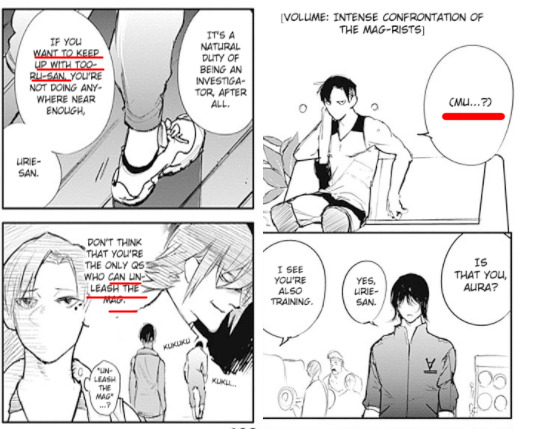
The first omake to have anything potentially of substance is the confrontation between Shinsanpei and Urie. A confrontation which also results in a return of Urie 400%, but we’ll get to that in a moment. The new details are the tidbits that are shown in Shinsanpei and Urie’s brief exchange of words.
Let’s cover that and more under the cut:
The first is that Urie mistakes Mutsuki for Aura at first, which supports the notion that Aura at this moment exists as a foil to Mutsuki which is the reason the two are so often being partnered up.

Shinsanpei mirrors Mutsuki’s own transformation from a timid personality to one that revels in violence. He also shares the same eye motife, as seen above either one or both of Shinsanpei’s eyes are always covered only revealing themselves when he becomes especially bloodthirsty. Shinsanpei’s mirroring of Mutsuki though is to a much more minor extent and for lesser reasoning, something the omake seems to acknowledge even with Higemaru calling him an “Aunt-Con”. Perhaps by foiling Mutsuki to a character whose motivations are much more shallow and petty, as Aura herself does not want Shinsanpei to avenge her, it also highlights who despite the anger that Mutsuki justifyingly feels at the world for abandoning him and the suffering he’s endured, his current acts are in a way just as selfish as Shinsanpei’s.
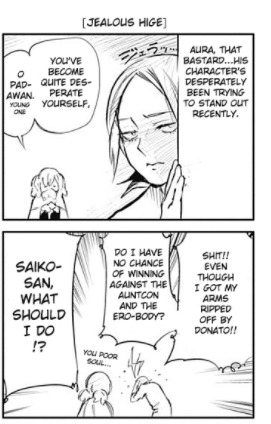
There’s also two more pieces of foreshadowing, Shinsanpei hints that Mutsuki is actually much more powerful than Urie currently is and somebody who needs to be competed with. This was also hinted as far back as the Donato fight, where it was implied that Mutsuki had a much higher rc cell count already then Urie who was hitting dangerous levels.
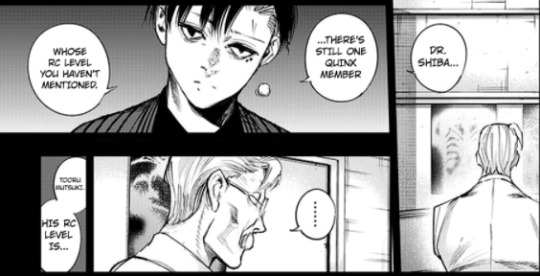
As for how he attained these levels, it’s implied as far back as 100 that Mutsuki has been killing and hunting humans. Perhaps even eating them in service of strengthening his kagune. Which would also make sense with what Shinsanpei implied next, that he too like Urie could reach the same level of kagune formation when he framed out. Something that probably would only be possible if Shinsanpei began to eat human, or even ghoul meat alongside Mutsuki. His humiliating loss to Kaneki Ken could have served as proper motivator to do so.

The Return of Urie 400%
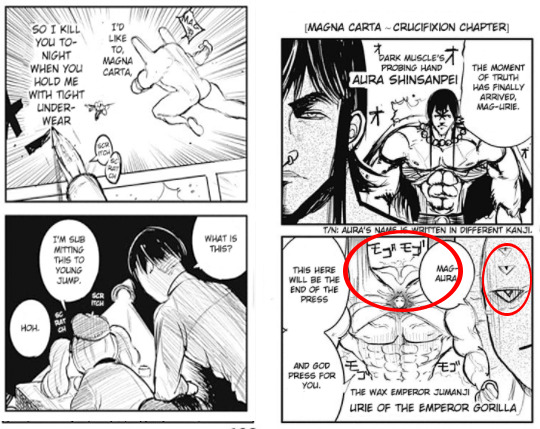
Urie 400% has always been foreshadowing for Urie’s inevitable transformation into a kakuja. If the fact that it already happened is not enough proof to convince, I’ve already written a meta on it here [x].
As I’ve highlighted though, this return of the Urie 400% is even more monstrous than the previous one. It has features such as giant protrusions from the shoulders, and multiple eyes. The first has been shown to be a trait of Urie’s framing out, while the second is a trait of many Kakuja’s before Urie, Eto, Tatara, and Kurona to name examples.

Thematically it makes sense for Urie to frame out again too, as previously he was saved from facing any real narrative consequence for his own actions by Saiko. In other words he was “saved from the web.” However despite literally endangering the mission and attacking his own comrades something that was eluded to be punishable by death if a Quinx were to lose control of themselves, Urie was promoted.
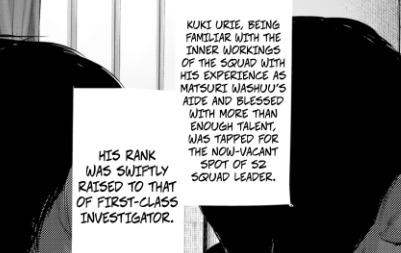
A promotion that he did not in any way earn considering that he literally broke the one biggest rule of the Quinx. Not only that but there is a great deal of fallout one would presume from Urie smashing his frames entirely and becoming a full ghoul, something that the audience has not witnessed. There is no mention of what Urie is now eating, or if he’s being treated the same way Sasaki was, or if he’s truly become a full ghoul despite all hints that he indeed has. Urie has not even begun to sympathize ghouls, only being moved to action because of his feelings towards humans, Yoriko and Bujin in particular. The obvious conclusion then is that Urie’s character arc is not done yet but rather Saiko served as to Urie, what every character has been doing to ignore the consequences of their action in this arc. That is to deeply engage with personal relationships instead of looking at one’s self.
The consequence for this might be Urie being set up as what he hates the most.
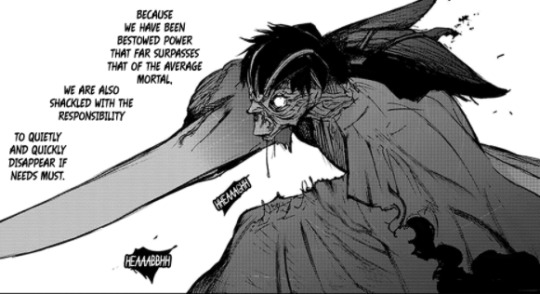
Urie being placed in a life or death situation with no Quincke against Furuta and two of the strongest ghouls in the series may force him to frame out and if he has truly been eating ghoul meat instead of human meat in order to sustain himself now that human food is impossible to eat, he might even develop a full Kakuja. In that case Furuta would have all the evidence he needs to frame the murders of Kuroiwa and others on Urie himself, and place him on the execution block. After all, Furuta put a special focus on witnesses when he made his move against them. Furuta’s word in that situation would count far more than Urie’s.

The suggestion in the omake that Shinsanpei himself might also be capable of framing out the way that Urie did is also a deadly suggestion for the future of the Q’s. After all when Furuta makes mention of his dragon, what shows up is a picture of each of the three first generation Q’s still alive.
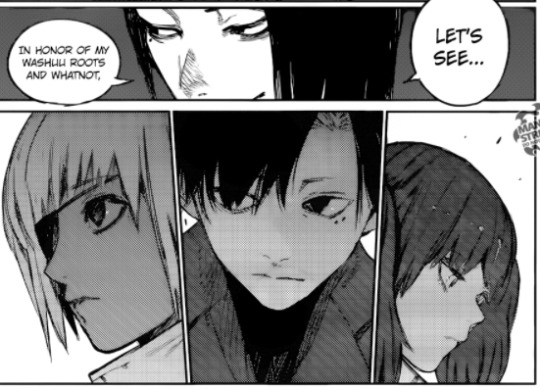
The Q’s project was also originally credited as Tsuneyoshi’s idea. Perhaps Furuta might even use Urie’s framing out as a power play to gain control of the remaining first and second generation Q’s in order to form his dragon, or even worse he might expunge them from the CCG entirely and declare them a threat to safety which would cash in Saiko’s own foreshadowing laden words “I’ll become a terrorist” in a way she never would have wanted to come to fruition.
Hanbee’s Death and Suzuya’s Changing Sides

Nakarai misunderstands in the omake and says that he would probably kill Hanbee if the fighting were to end. This joke is a part of a long running series of gags where Hanbee is injured by a member of Suzuya squad, or a member makes a light reference to hurting him. In fact Hanbee has been shown stabbed in the head too many times in the omake to make it a mere coincidence.
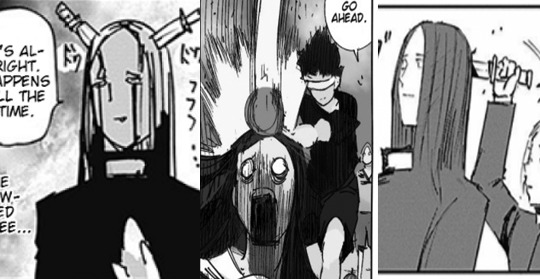
This also makes sense as a narrative consequence to Suzuya. He said himself that he might just become a ghoul were the conflict to end, he’s already thinking of switching sides. The thing that currently keeps him in place is the fleeting hope that Shinohara come back, and the idea that he has to act in Shinohara’s memory.
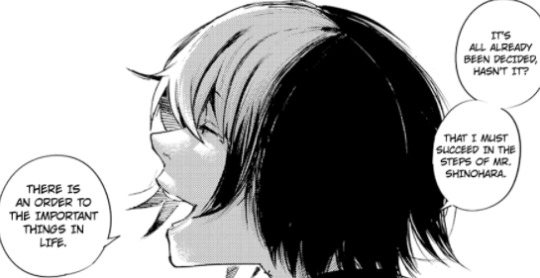

The same way that Urie has not learned to see Ghouls as people, Suzuya has not learned to sustain loss in any kind of way. All he can do is hope for the increasingly impossible return of Shinohara, the first human connection he has. Even when surrounded by four people literally devoted to his existence, Suzuya cannot stop his pining for Shinohara because he cannot feel and move on from that loss.
The Suzuya Squad also, act as a sort of buffer that prevents Juuzou from really facing consequence. They protected him during the Kurona fight even though Kurona was a case of reaping what he sewed by killing her sister all those years ago and having yet to show any remorse. When Uta played withhis feelings for Shinohara, it was Abara still who snapped Juuzou out of it immediately rather than Juuzou facing those feelings and snapping himself out.
If the bubble were to be removed than Juuzou would grow, and grow he must if he’s a character that exists within a narrative.
Child’s Play

This entire omake seems to be hinting at the fact that 24 year old Furuta, 23 year old Kaneki are about the same general maturity level of thirteen year old Ayato when he first said that quote.

It’s a further hint that both kings are really just children playing a game. Something that was also hinted at in the previous omake too when Kaneki turned crucial information into a game of 20 questions.
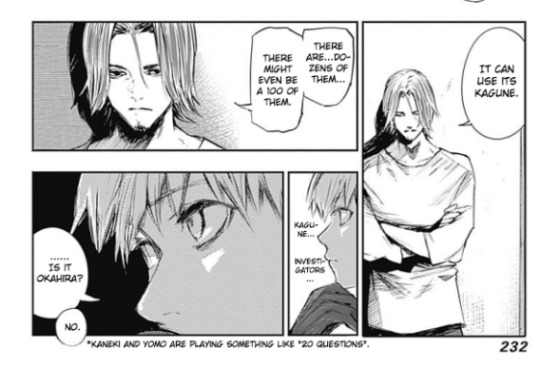
Kaneki also refers to himself as a child when conversing with Furuta in the past, Furuta calls him his baby faced boss when facing off in the cochlea with Rotten follow, and Kaneki’s shadow image of himself, the incnarnation of his memories when he was still Haise was that of a child. Furuta at the same time was born at a leap day, and refers to himself as being only six years old in his birthday poem.
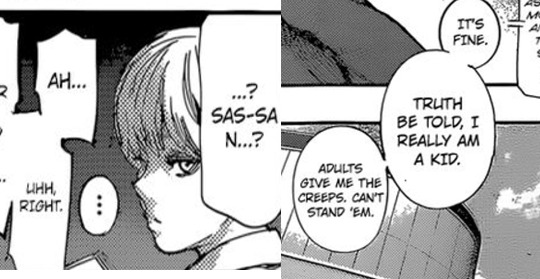
A Dummy, That’s what I am
Finally, I think it’s important here that the omake shows Yoriko’s general obliviousness towards ghouls.
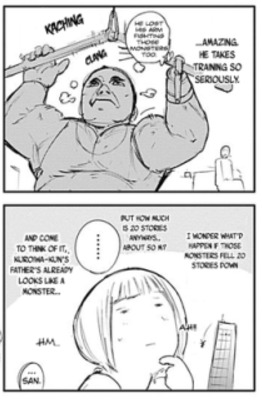
She refers to them as “those monsters”. This is the same character whose best friend is a ghoul and who is currently being executed in her name. The fact that she thinks of him falling off a building is a twofold reference, one that Kuroiwa literally was pushed off of a building and survived when Eto landed as the one eyed owl. Revenge probably for what Kuroiwa himself did to her when he was only fourteen, as Eto references falling in her flashback. The second is her musing that a ghoul might not be able to survive a fall from that height is a reference again to both Eto and Kanae who did fall off a particularly large building, though one survived and one did not.
It’s probably not anything particularly meaningful but it’s an interesting case of parallelism at least. Iwao also says something that is important towards his and Bujin’s characterization.

“We’re both quite simple people” both Bujin and Kuroiwa are shown to be to the book to the point of it being a flaw. Their own actions against ghouls may een be for reasons as simple as Yoriko’s, that they simply are oblivious to the fact that they might feel human emotions. The same way Yoriko describes them offhandedly as “those monsters” as if she barely knows about them, even though she spent a good portion of her life with one.
It speaks again of the privilege that humans have to be above this sort of conflict. Iwao and Bujin to this point have never needed to relate to ghouls, or treat the CCG as anything other than a 9 to 5 job they participated in. The same for Yoriko who married a ghoul investigator while knowing nothing about ghouls and inadvertantly led him to her best friend a ghoul herself. Yoriko’s fatal flaw in this case is her own obliviousness. Perhaps she did not deserve to be executed by that fact or exploited the way Furuta did, but Yoriko herself even scolds herself for not noticing.

For buying into the simple illusion that Touka was perfectly happy eating her food, the easy lie that they were happy all along in their simple friendship. Had Yoriko bothered to notice, Touka would not have been all alone in her pain.

202 notes
·
View notes
Text
SnK S3E12 Poll Results (Manga Reader Version)
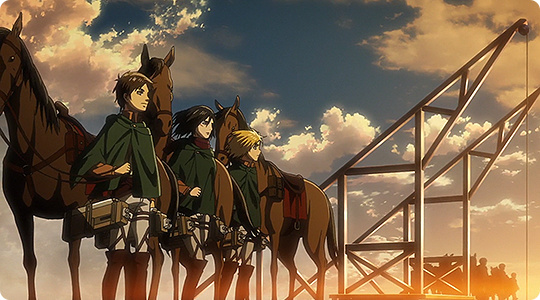
The poll closed with 487 responses. Thank you to everyone who participated!
Please note that this is the results of the manga reader poll. Anime only watchers are suggested not to read if you do not wish to be spoiled about certain events! Anime only viewers, click here to view your poll results!
RATE THE EPISODE 481 Responses
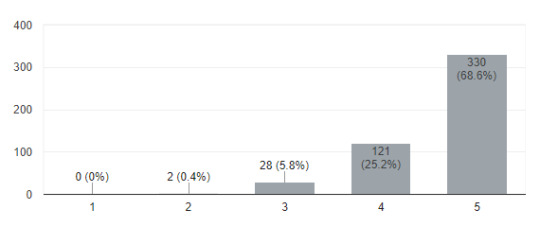
The final episode of the first half of S3 was another banger with positive reactions. Compared to earlier in the season when manga readers seemed more dissatisfied with the adaptation, we are happy to see that the final episodes of the arc turned out to be a much more positive experience!
Considering this episode was essentially just the calm before the storm, I was pleasantly entertained by it. Not the best episode because not a whole lot happened, but still it did what it needed to do.
I was super worried they would change something in this episode but thank Ymir-sama it's okay.
IT WAS AWESOME AND THAT ENDING IS ONE OF THE BEST THING THIS ANIME HAS EVER MADE!
This episode was so good! And funny! And angsty at the end! All the ingredients that make a good AOT episode
Very good, the preview was spooky and the whole episode had humor to lighten the mood, some emotional stuff and High Anxiety Cliffhangers to finish us off. Its gonna be a long 6 months.
HOW WOULD YOU RATE THE FIRST HALF OF SEASON 3 AS A WHOLE? 481 Responses
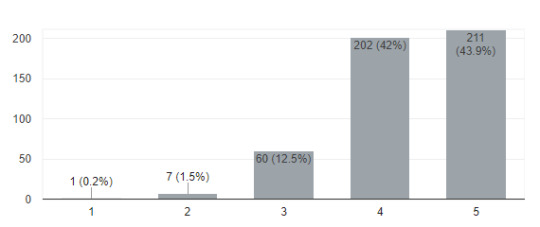
Overall, the first half of season three was satisfying for manga reading poll takers despite the changes.
All in all, absolutely stunning season. From the bottom of my heart, thank you WIT.
It was a really good episode. It followed manga perfectly. Every ep. of Uprising should has been like that. Too bad it wasn't, that why I rated the whole series pretty lowly. Honestly, I expected something better. But that was fine, not the worst. Yet, I would have changed a lot.
Really good way to end this half of the season. Can't wait to see the next half. It was nice to see a "calm before the storm" episode.
It was a brilliant idea to end the first part of season 3 right there, by doing this we were given proper construction to this arc.
HOW DO YOU FEEL ABOUT THE SEASON TAKING A BREAK UNTIL APRIL? 481 Responses
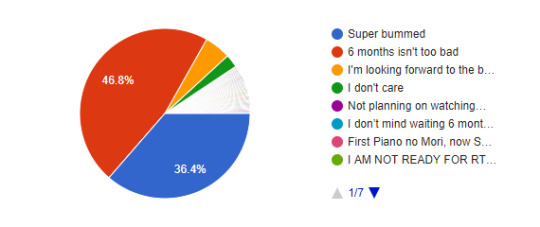
About 37% of respondents are sad to see the anime take a break, but nearly half of voters are fine with the break stating that it’s not too bad of a wait, with some who are even looking forward to the breather for a bit (we’re looking forward to having a good rest as well although we will miss the anime!).
I'm okay with it since it means that we will a get a really well made RtS arc. But they really should've said that the break was going to be this long earlier. Or just called it season 4
Waiting is something we SnK fandom know how to do, unfortunately
As a manga reader it's easy to not be too upset since we'll have plenty of chapters during that time.
It's nice to get a breather before shit hits the fan.
I don’t mind waiting 6 months when I know it means the animation will look a lot nicer as a result
I feel like i would have been less upset if they just told us from the start how its gonna be... I hated the uncertainty
If it means a fantastic second cour then I'm all for it. I mean my life is empty and I wish I were dead, but other than that I've accepted it!
6 months for preparing myself to let Erwin rest in peace
I AM NOT READY FOR RTS THIS IS LITERALLY THE FIRST TIME IN MY LIFE I AM LOOKING FORWARD TO A HIATUS WHAT HAVE YOU DONE WIT
WAIT Studio
Does Annie have some space next to her for the next 6 months?
WHICH OF THE FOLLOWING SCENES WERE YOUR FAVORITES? 480 Responses
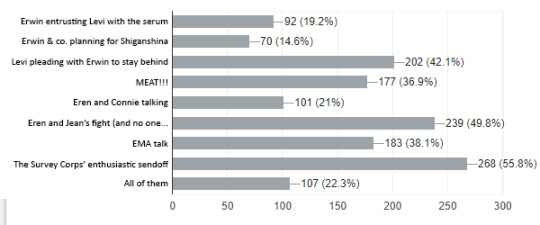
The Survey Corps’ sendoff was the most favorite moment of the episode, followed closely by Eren and Jean’s nostalgic fight. Levi and Erwin’s talk after the meeting made it to third most favorite scene of the episode, followed closely behind by Eren, Armin and Mikasa’s conversation. Everyone losing their minds over meat was another favorite.
Erwin was so perfect, I loved his little laugh, I thought the whole interaction with him and Levi was done so well... god, I'm gonna miss him so much, it actually hurts.
Good breather episode, comedy gold with the dinner scenes, and the send-off was just as fun as it was touching. Also, the extra scene was creepy and great, but I hope anime-only watchers don't spoil themselves trying to find the meaning to it...
I think they did a really good work with the Erwin x Leviv talk, and EMA talk... Since enfatizing Erwin's reasons, and showing Armin's, It became more clear Levi's choice in future
I loved EMA talk... it made me pretty sad because of the events which now are taking place in the manga. That was good to see them together in the anime.
My Eruri shipping heart was in tatters, I tell you. I've been looking forward to the ""I'll break your legs"" scene for ages now, and shit, watching it was a literal punch to the gut. Erwin's beautiful roar of victory on the wall, his final ""SUSUME"" just... I was in awe.
Sasha nomming on Jean’s hand was even funnier animated
The 104th dinner scene was just perfect! It's been so long since we had a scene of such warmhearted camaraderie, it really brought back all my season 1 feels for the babies. Beautifully done.
Overall great Episode, really liked how they foreshadowed Erwins Demise and his conversation with Levi, EMA talk was great too, and the serumbowl scene made for an amazing cliffhanger
DID THE GLITCHED ENDING SCARE YOU? 483 Responses
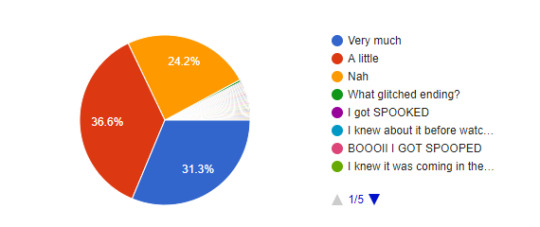
The abrupt reminder that SNK is a horror anime definitely seemed to work! The majority of people were scared by the ending at least a little bit, and some were thoroughly terrified.
"Blink and you'll miss it" my a**
Honestly it reminded me of how horrid the show actually is. I forget it's not all cute and funny scenes with a tinge of "yikes" that happened, but instead vice versa
I knew it was coming in the ED but didn't know WHEN and I was just anticipating it like a dark corridor in a horror movie XD
Moreso that scare me, it got under my skin and just stayed in my head the rest of the day.
Scare is not the right word. The option I'm looking for is FUCKING WRECKED
I learned that apparently a lot of you watch shit alone in the dark. But to answer the question, no, not at all.
It thrilled me to see them cleverly setting up the next half of the season this way
Only the Levi's distorted "you guys". The glitched ending was awesome
I saw some screencaps of it prior to watching so I was somewhat prepared but it was way creepier than i thought it would be, it spooked me
It wasn't actually SCARY, but I fucking loved it. So twisted and creepy
rip ears in that ending, it makes for some great youtube reactions though lol
Well, mark me down as scared and horny
SHOULD ZACKLEY’S ART BE REALIZED? 478 Responses
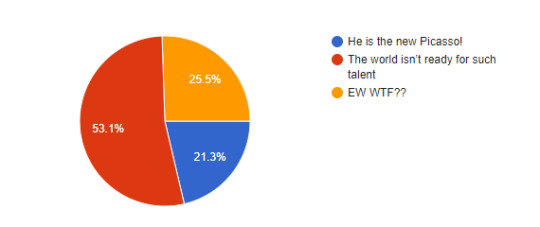
We suppose the real question is, when will Zackley’s “art” stop becoming something we ask about? :P All in all, most of you agree that it should not be seen or talked about. 21% of you are still finding humor in it.
HOW MUCH DID YOU ENJOY THE SEQUENCE OF EREN AND JEAN FIGHTING? 483 Responses
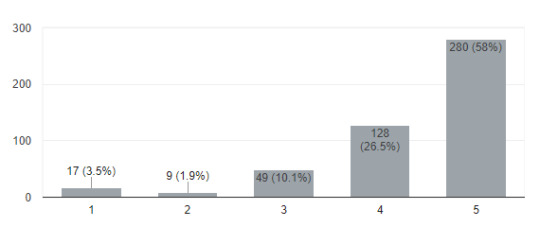
Most of the viewers enjoyed Eren and Jean’s antics with 84% rating the scene with a 4 out of 5 or higher.
Mikasa letting them fight and not dragging Eren way is the best part! It's such an important character development for her. Also this Episode was full of parallels to their training days. Great episode.
Eren and Jean bringing the Drama™ (as expected of Eren and Jean)
THE SURVEY CORPS HAS NEVER EXPERIENCED A SEND-OFF LIKE THEY DID IN THIS EPISODE - FAVORITE PART OF THIS SCENE? 481 Responses

The surreal experience of getting a positive send-off like this made Erwin’s smile and shout the overwhelming winner here, and for good reason! A smaller portion of respondents enjoyed Springlestein being themselves and a few called out Levi’s face in the comments:
All of it. Because it will be the first and the last time we'll see it
YYYYEEEEEEEAAAAAAHHHHHHHHH
Levi looking at screaming Erwin like "WTF Erwin"
Hange smile
LEVI'S SOFT LOOK
I like the manga version better because Levi's smile was softer there
Levi's expression when Erwin did his triumphant shout.
literally everything about it was perfect
WOULD YOU LET LEVI BREAK YOUR LEGS? 480 Responses
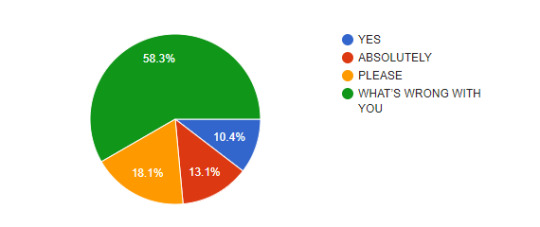
While 58% of respondents cannot understand why anybody would want their legs broken by Levi, a small percentage were even asking for it.
THE EPISODE WENT EXACTLY AS THE ORIGINAL MANGA! 478 Responses
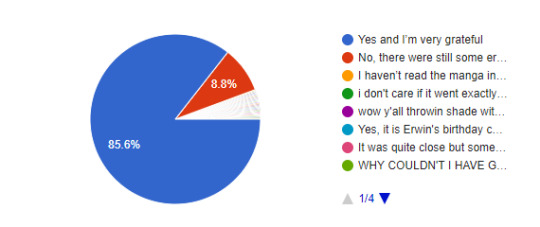
So, the story behind this one is that one of the pollsters posted this “question” on our original document as a joke while another one of us was at work. When the one at work got off, they put the question onto the poll form while the person who created the “question” was not online, not realizing it was meant to be an unpublished joke. This was completely overlooked during the final proofread. It was never actually intended to make it onto the poll but since one of us always tries to rush through things, here we are! In any case, we hope you guys had a good laugh, because we all collectively lost it when we realized the mistake much too late!
wow y'all throwin shade with this Q huh
Yes, it is Erwin's birthday celebration after all
Glad that Erwin and the crowd’s screaming was a ‘dialogue’ and that he screamed again.
Makes sense, given how its purpose is to set up the new arc. Not much need to leave things out for the sake of pacing.
They done it so perfectly! I love that episode and love the hope in the air, my man similing and being happy, I love they see people cheering for them. THAT was earned.
It still modified some moments like Armin thinking of Eren and Mikasa instead of the bullies in the manga. Maybe it's better and more consistent with the following events.
Thanks God! The whole series should has been this way. Compared to the sad 1st episode of Uprising, this one was a true masterpiece.
u people need to get the salt in your blood checked, let others be dissatisfied with something they care about? please and thanks
i don't care if it went exactly as the original manga or with some changes as long as the episode is good
THE CHAPTER SIGNIFIED THE START OF A NEW ARC, BUT THE ANIME USED IT TO END THE FIRST COUR, WAS THIS A BENEFICIAL DECISION? 478 Responses
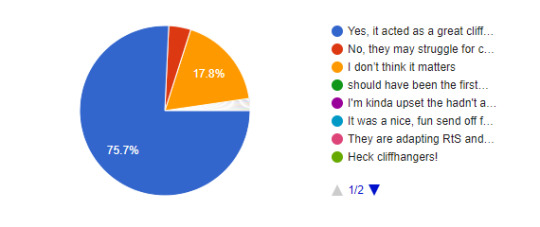
The majority of folks thought shifting the send-off to the end of the cour to create an uplifting cliffhanger was a good way to end the season. Several people called attention to how much contrast was felt between such a positive ending and the credits scene.
I think it works great, especially the triumph of the send off and the "oh shit, what's happening" moment in the ED
should have been the first ep of the next arc, with the send off as the cliffhanger
It was a nice, fun send off for the arc. Has the suspense of the scouts going towards the foes. The next episode with the next chapter/s will be perfect for getting back into the series after 6 months
WAIT Studio used it as an effective cliffhanger but from an adaptation perspective it's just like the Wall Titan. Something to keep the audience's attention at the cost of the narrative's flow. If the season was going to be split then rushing the Uprising Arc at breakneck speed resulting in one extra episode was pointless.
The opening of 73 is a perfect opening for the second cour, so I knew from the beginning of the season that ending in this chapter would be their aim. The second half won't struggle for content, and they can either push ahead flashbacks (I expect some of Bert's parts from 96 making it into the adaptation of 77) or content that didn't make it in the first half used to extend other parts (Eren's experiments for Armin realizing how to beat Bert in 81)
I think this will help the second part by being on the way to Shiganshina to start it off.
Heck cliffhangers!
LEVI WASN’T EXPLICITLY SHOWN EAVESDROPPING UNTIL THE END OF EMA’S CONVERSATION, DO YOU THINK THIS DIMINISHED THE FORESHADOWING? 478 Responses
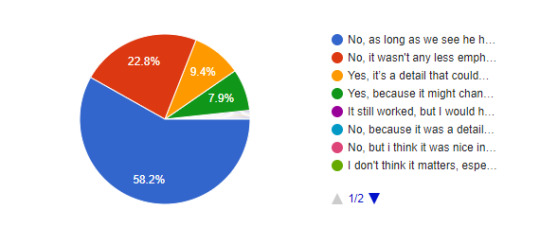
The vast majority of respondents agreed that as long as we saw him listening to them, that’s ultimately all that matters. A small few believe that not showing him listening in on them earlier will diminish the overall impact when he makes his decisions later, however.
I don't think it matters, especially if the anime includes a flashcut to this moment post-decision, which will make its important even more obvious for viewers who may not remember this scene at all.
I'm not sure, I guess it did seem more ambiguous here. They'll flashback to it when serumbowl happens though.
Wouldn’t have spent more time on it. This show is about subtle details. I think its ok.
It still worked, but I would have liked it to have been made clear that he saw Armin's expression when he was talking about the ocean
No, but i think it was nice in the manga to see that at the beginning of the conversation he was standing and ended up on the floor by the end of it. Small detail, but i took it like he didn't mean to listen in the beginning but decided to stay in the end because of what he was hearing?
No, because it was a detail it meant a lot more. Subtle details have greater impact in visualities, manga is a different medium and the scene was used properly for its medium.
HOW DO YOU FEEL ABOUT WIT SHOWING *THAT PART* OF THE RTS ARC AS A TEASER? 480 Responses
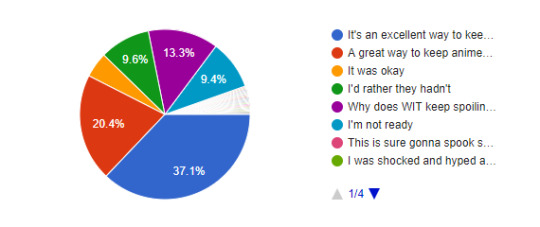
38% of respondents believe that the teaser was a great way to keep interest in the series high. 20% specifically feel that it will keep the anime only fans invested. About 21% of respondents combined don’t think it was the smartest choice on WIT’s end while almost 10% are just not ready to see that animated at all.
Even though I already know what will happen, my body *isn't* ready for this shit to come, except for the lightning spears
Honestly, I thought it was stupid as fuck and a cheap way to keep hype up for anime-only people. I would've preferred my anime-only friend to go into RTS completely blind.
I think it's great because it lends itself a lot of hype for the next half as well as leaving it very open ended. Especially because they cut out lines about the serum.
I think this teaser shocked more the manga readers than the anime onlines.
It's the worst part of the manga they could spoil. I'm not sure what they intend to do by showing such a controversial moment
It was brilliant. Anime only watchers don't often get the experience of agonizing over certain cliffhangers monthly, but with this flashforward looming in their head, they have a whole season of suffering ahead of them. SUFFER LIKE US, ANIME ONLIES!
I really liked it but I think they could have shown a part of Bert/Reiner/Zeke’s convo since we saw Bert and Reiner at the end of the episode, and it would have anime-onlies wondering who the glasses guy is
I was shocked and hyped at seeing them include this scene, but at the same time I’m sad that anime-onlies were spoiled that at the very least Mikasa, Eren, and Levi will survive until this scene, destroying any tension of them dying
I'm really conflicted; on one hand, I was very surprised in a positive way, cause it was a ballsy and unexpected move. On the other hand, I understand that anime viewers might be sick of spoilers bc of the scene at the beginning of ep1.
It gave me anxiety lol. Please someone save my babies from their horrible destiny
One hell of a cliffhanger and I can't really imagine anything better to show everything going wrong (Colossal nuke is way too obvious, for example), but the people complaining about spoilers do have a point...
WHAT ARE YOUR EXPECTATIONS FOR RTS’S ADAPTATION? 480 Responses
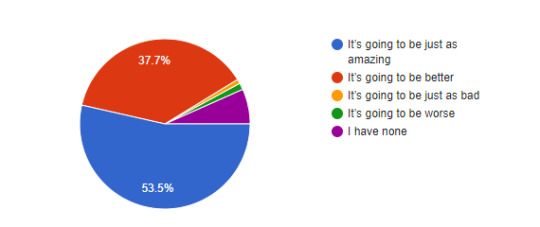
WHAT SEGMENTS OF RTS ARE YOU MOST LOOKING FORWARD TO SEEING ANIMATED NEXT COUR? 481 Responses
Over half of respondents feel that the Return to Shiganshina arc will be delivered just as well as Uprising was. 37% of respondents feel it will be much better than Uprising’s adaptation. A small few don’t have much faith in the second half of the four.
FUCK ME UP!! R.I.P. ANIME ONLIES
GIMME THE 2ND COUR NOW!
I don't know if I'm emotionally prepared for this arc
I’m going to have 6 more months to mentally prepare myself for the return to shiganshina arc and I still won’t be ready
from an adaptation perspective it's going to be the same as the previous seasons. WAIT Studio excels at certain aspects of packaging SnK into anime, but as a whole it's a bad, rather than amazing, adaptation.
Is there a "NOPE I am not ready for RtS arc" in the questions?
WHAT SEGMENTS OF RTS ARE YOU MOST LOOKING FORWARD TO SEEING ANIMATED NEXT COUR? 481 Responses
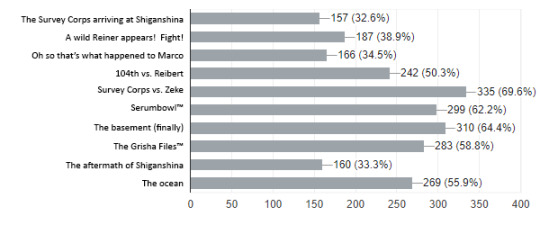
The most anticipated segment of the Return to Shiganshina arc is the suicide charge + Levi totally wrecking Zeke. Following closely behind are the basement reveal, the serumbowl, Grisha’s diaries and flashbacks, the ocean and the showdown with the 104th and Reibert.
Kill me! I cannot believe I have to wait 6 months for RTS. 6 months until I can see Reiner and Bertholdt in action and the FREAKING BASEMENT!!!! I was fine with a 3 months break but 6 is too much ;____; I want to see Grisha's past animated
What everybody is waiting for the RtS Arc: the basement, Reibert fight, Levi soloing the beast titan, the ocean. Me, an intellectual: THUNDER SPEARS THUNDER SPEARS THUNDER SPEARS THUNDER SPEARS THUNDER SPEARS THUNDER SPEARS THUNDER SPEARS THUNDER SPEARS THUNDER SPEARS THUNDER SPEARS THUNDER SPEARS THUNDER SPEARS THUNDER SPEARS THUNDER SPEARS THUNDER SPEARS THUNDER SPEARS THUNDER SPEARS THUNDER SPEARS THUNDER SPEARS THUNDER SPEARS THUNDER SPEARS (and Grisha's backstory)
can't wait to see historia looking graceful as hell in front of the sunrise while the SC goes off to fuck reibert and zeke up
The only thing I can think about is Zeke.... *screams* ZEKE AND EREN! THE JAEGERBROS! AND THE GRISHA FILES! SO MANY JAEGERS *dies*
I'm definitely looking forward to RTS okay, but I'm dreading it more, honestly. But the one thing I'm looking forward to, and really hoping they'll animate, is Levi taking down those Titans on the way to Zeke. I know the focus is on Erwin's last charge in the manga, and rightly so, but DAMN, I want to see Levi do that -I honestly don't think anyone, even Mikasa, could do what he did there.
I have a fever, and the only prescription is Season 3 Part 2
ADDITIONAL THOUGHTS ON THE EPISODE?
A pretty decent choice for a midseason finale. But most important, a pretty good choice for episode 49. Once we're back in April, the series will be celebrating having made it to 50 episodes. Just 2 years ago, we were wondering if we'd ever get episode 26, and now we're getting to a landmark episode that will be exciting and memorable! Nothing between chapters 70-72 could've worked as such a landmark, in my opinion, but chapters 73-74? Absolutely perfect for it.
And my ship finally got some screen time
But damn wit... I almost got a heart attack because of the glitched ending!! Please, I at least want to survive to see manbun Eren animated
For anime watchers: I enjoyed watching your confusion over that ED. May you all be prepared by April 2019.
My heart is filled with so much Eruri that I may cry. You could literally see how much concern Levi had for Erwin in his eyes.
I love Bertoto and Raina more than myself. Guess, I'll die in April.
I'm an Erwin Lover™ and the show is gonna come back right around my birthday so this was Great and I'm Fine
It was out of character to see Eren fully clothed.
The moment when SC were cheered up and Erwin was so confident and happy and then they left into the sunset gave me goosebumps and almost made me cry :') it was a beautiful, strong, encouraging moment for SC!!
Let me just tell you how fucking HYPED I am for the next season after those previews during the ED. HYPED. And Jesus fuck yes, Armin looked like a charred French fry that got left behind in the oil. THANK JESUS. I was afraid WIT might downplay that, but no, my boy gonna be the CRONCHIEST.
The glitches were great and not too spoiler-y but WIT absolutely ruined it with the Eren/Mikasa/Levi scene. They showed too much.
rip ears in that ending, it makes for some great youtube reactions though lol
Erwin looked fine as fuck
Wit, you better be paying for my doctor visit. My ears were bleeding with your little trick you pulled at the end.
This episode. THIS FUCKING EPISODE. Man what a way to end the cour. REALLY, standing ovation to WIT. That glitch ending was just like that tiny Titan-in-the-wall scene at the end of season 1 that made me go looking for the manga. Absolutely brilliant stuff.
Thanks for these polls.
WHERE DO YOU PRIMARILY DISCUSS THE SERIES? 446 Responses
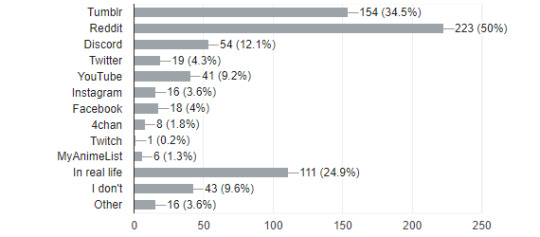
Thank you to everyone who participated!
Please keep your eyes peeled for an upcoming Uprising Arc poll!
28 notes
·
View notes
Text
In Youth: Episode 29 Recap

I decided to recap this episode because of the major payoffs we have. This drama is very meaty in content. So much so that it actually takes time for me to watch this. I can’t just be trigger happy on the fast forward 5 seconds button. I even have to repeat certain portions. And I love how the payoffs we have is not how the character develops as a person but how we are led to and finally understand each character and love them for all their flaws.
Ge Yihan and Xuanli
Xuanli receives a pair of heels from Ge Yihan. The ones she couldn’t bear to purchase because it was too expensive. She screams with joy because she thought he finally released his anger.

However, Ge Yihan breaks up with her saying he doesn’t want them to keep hurting each other and that he is becoming more afraid because of how she is able to laugh off pictures of him being with other women. He doesn’t dare to be with a woman like that. She embarrassedly clarifies that she wasn’t angry because it was her all this time. Whenever he got drunk, she was the one who picked him up, not another woman.

In a flashback, we see her berating him jokingly while he was drunk and asleep, “You feel the need to see me fret over you so that you feel like you exist. (Scoffs) And to think, you said previously that relationships will eventually return to peace and normality. But in the end, the moment I start getting busy (with work) you start the sufferings again. Ge Yihan, I think this is just the way we work. It’s not anything bad.”
I love how the scriptwriter led us to this realisation. In a previous episode, we saw her friends taking a bat, wanting to take a swing at someone for her justice. She played along and told them it was fine, she can handle it. Ziyu was puzzled but they jokingly explained to Ziyu that she trained them to be dramatic. She replied that she was happy with the performance and promptly got over her anger.

Obviously, he did not hear or understand that fact so he proceeds to berate her asking her if she’s crazy. What if every time he was drunk she didn’t catch him in time? She says she always does. He replies, “Not this time.”
Enter the front desk girl, whose name I don’t bother remembering.


The new couple proceeds to drop by a store selling cameras. He decides on a camera but says he will get his friend to bring it over from Hong Kong because it’s too expensive in Beijing.

They then go to a cafe. She excuses herself to buy ice cream but went to buy him that camera instead. He tears because no one has given him such an expensive gift before, he was always buying things for Xuanli. She has never even gone shopping with him for the things he is interested in.
Cut to: Yangyang finding Xuanli on the floor in the dark, crying.

She cries telling Yangyang that the new expensive shoes Ge Yihan bought tears her ankles so she has bought a bunch of shoes to replace it. But she only likes the shoes he bought. She cries saying she doesn’t know what to do.

Yangyang knows it’s not about the shoes but doesn’t ask her further. She hugs Xuanli, and tells her that it’s okay, tells her not to cry. The next morning she calls Weicong and tells him that the situation is really bad. Xuanli is not fighting back, she’s just keeps crying in bed. Weicong knows the gravity of this and Yangyang manages to convince him to put aside his grievances with Shucheng to work on getting to Ge Yihan together.

Adorably, she does a subdued little pat on her own back “Xuanli gets back with Ge Yihan and Weicong with Shucheng.“ (Snaps fingers) “Perfect.”

The asshole sends his new girlfriend to work and Xuanli (wearing the shoes Ge Yihan gave her) witnesses this. Xuanli can’t say anything because in real life, the girl can’t just stop working, she has a notice to serve before resigning.

Even Xuanli’s boss and the CEO is on her side. Director Guan thanks her for the work she has done to keep the existing customer base and proceeds to tell her to teach the front desk girl a lesson saying that the bosses will close an eye on this. Even tells her to leave it up to her imagination. She waves it off saying the girl is already leaving. Just as he was suggesting for Xuanli to make something up, trouble ensues. The subject of the complaint; the front desk girl.

Long story short, Xuanli throws a bunch of gifts at the customer and goes on her knees to apologise on the girl’s behalf. Ge Yihan sees them walking out with the girl in tears but does not notice Xuanli’s scabbed knees. He immediately jumps to the conclusion that Xuanli abused her position to punish the girl.
She slaps him. The front desk girl cries telling Ge Yihan that Xuanli actually helped her. Her girls arrive and Yangyang gets angry seeing Xuanli’s scabbed knees. Not wanting to make a scene at her workplace, she gets them to go into her office to wait for her.

She fixes her uniform and tells the girl. “I’m not helping you. This is my responsibility and what I have to do. You are my subordinate. I earn more than you and receive more respect than you. So naturally, I would step forth when a problem arises. Please get this clear, I’m not doing this for you. Put away your face full of self pity.” She lets Ge Yihan know that she slapped him to give herself justice. She may like to play but she has never thought of doing anything the wrong way. After he destroyed the love of her life, she only has this (sense of self) left. He insists that it is not his fault. He would not have misunderstood her if she wasn’t manipulative in the first place. Point blank, he says she asked for it.
She admits she is manipulative. But she points out that he is no less so. He manipulated her too, by creating a fake car accident. She says they are the same type of people, neither beyond reproach. (She uses 高贵 here which means precious and above the other or classier than the other)

Is it too hopeful to think this is a moment of almost realisation?
After 10 years, it’s amazing that he still doesn’t realise that what he views as the destructive parts of their relationship is what she has come to accept and love. She loves to go all out for the people around her at a snap of a finger and wants to be treated the same. She wants people willing to go to dramatic lengths for her so that she knows she matters but she will stop them from doing so because she cares about them. The ironic thing is that her friends are nothing like that but they understand this. Whereas he is exactly the same but can’t deal with it lightly.

Adorably, the guys get each other ready to march in only to find Xuanli crying as the girls remove the shards of glass on her knees and puts on medication.

Xuanli is usually strong but as her facade breaks, years of subdued pain hits her all at once. The time she kneeled on the floor as her father’s lover kicked her once. The time she kneeled for Ge Yihan when he left for another woman. She admits she did everything to prove she deserves to be loved. To prove her father wrong. Through the manipulation she has never let go of Ge Yihan. But in the end she only proved that she does not deserve to be loved. Just now, he questioned her morals just because of a girl he met a few months ago. This upsets her more than him letting go of her.

Ziyu cries and says “(That’s enough) Say no more. We are all here. We all love you.”
Yangyang’s office

Yang Yang is warned of the fact that Xixi is trying to get Gong Xiao Liang on her new media team. Yang Yang puts her mind on working on her articles saying that only good content is tangible, all else are peripheral.

Sure enough, Xixi makes him an offer which he promptly rejects with his usual proud attitude. I really want to like that he did this for Yang Yang, but 他嚣张的态度我真想拽了他.

Gong Xiaoliang: What do you think is the most basic element of interviewing a sports player?
Xixi: The news angle.
Gong Xiaoliang: It is respecting your subject athlete. What do you think is the most important factor that helped Mode Sport survive to today?
Xixi: You don’t mean Li Yangyang, right?
Gong Xiaoliang: It is their articles. Li Yangyang knows what is good and how to write top quality articles. To me, (compared to others) this is the platform that enables me to develop myself.
Xixi: Are you refusing me?
Gong Xiaoliang: Isn’t it obvious enough?
Xixi: Refusing the mainstream media of tomorrow for paper media that is limping on it’s last leg. You are such a fool. You can leave now. You really are not like a person born after 1995.
Gong Xiaoliang: Birds of a feather aren’t set apart by age. (Cut to him looking at Yang Yang working.) Yang Yang. You and I are of the same.
Okay, that last part was cute.

But his arrogance and disregard for proper procedure led him to submit a draft on an article with the same topic that the fashion department has been developing on. And their editor confronts Yangyang on it. Yangyang swears she told him to take it down.
When he found out that she took it down, he confronts her about it too. And tells her that he is disappointed that she sided with another department after all he did for her, including rejecting Xixi.
Their exchange was so good I translated the entire thing in a previous post cus the original translations on Youtube are terrible.
She basically lectures him about respecting his colleague’s work even if he thinks his work is better. She also points out that he only works when he likes and expects others to make way for him when he does. Whereas she works doubly hard when she knows nothing about fashion.
So much feels but I already took 4 hours to recap this. I’m exhausted. Will come back to edit this post again.
0 notes